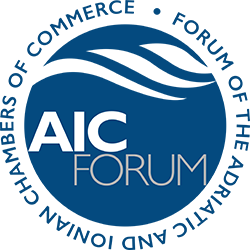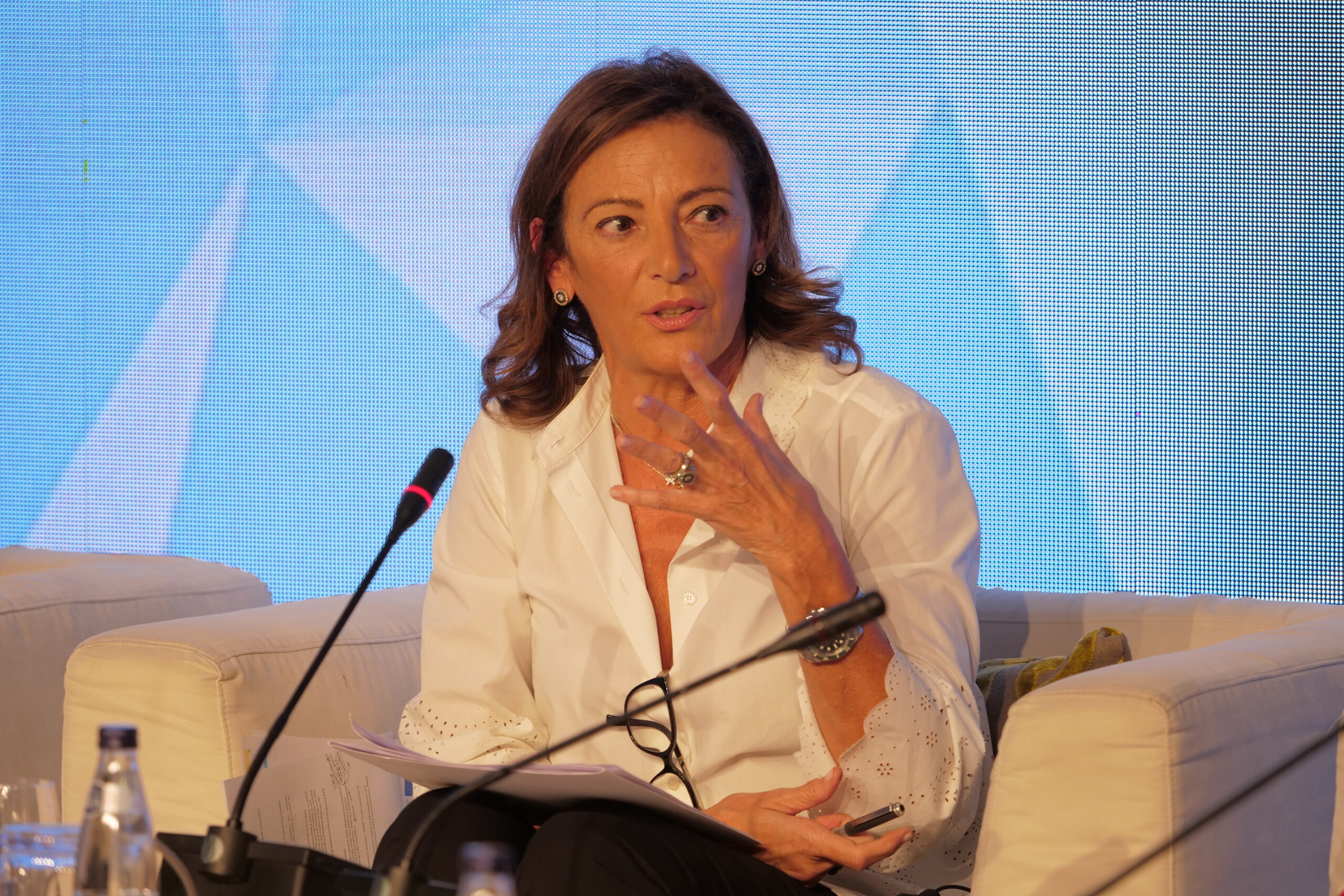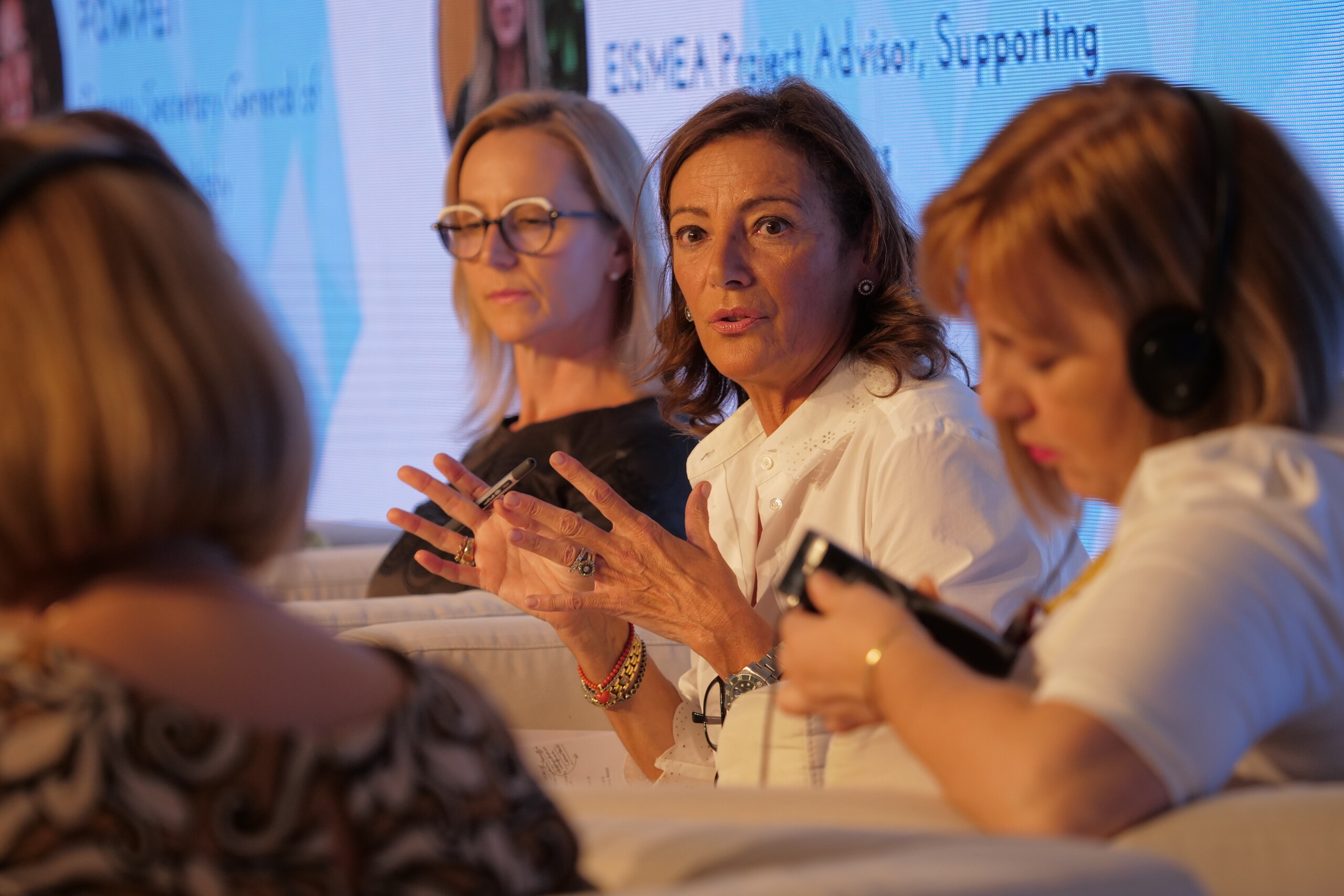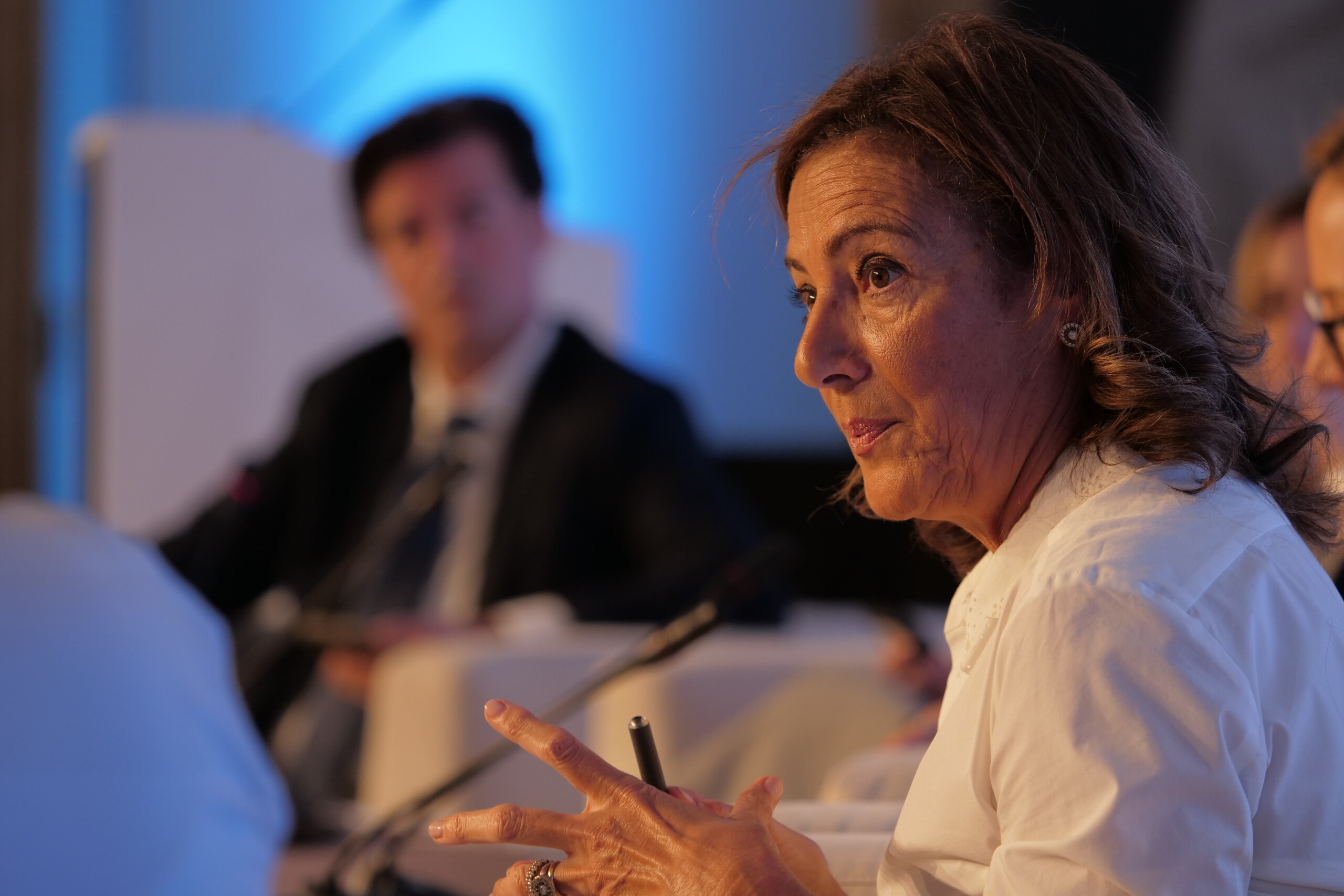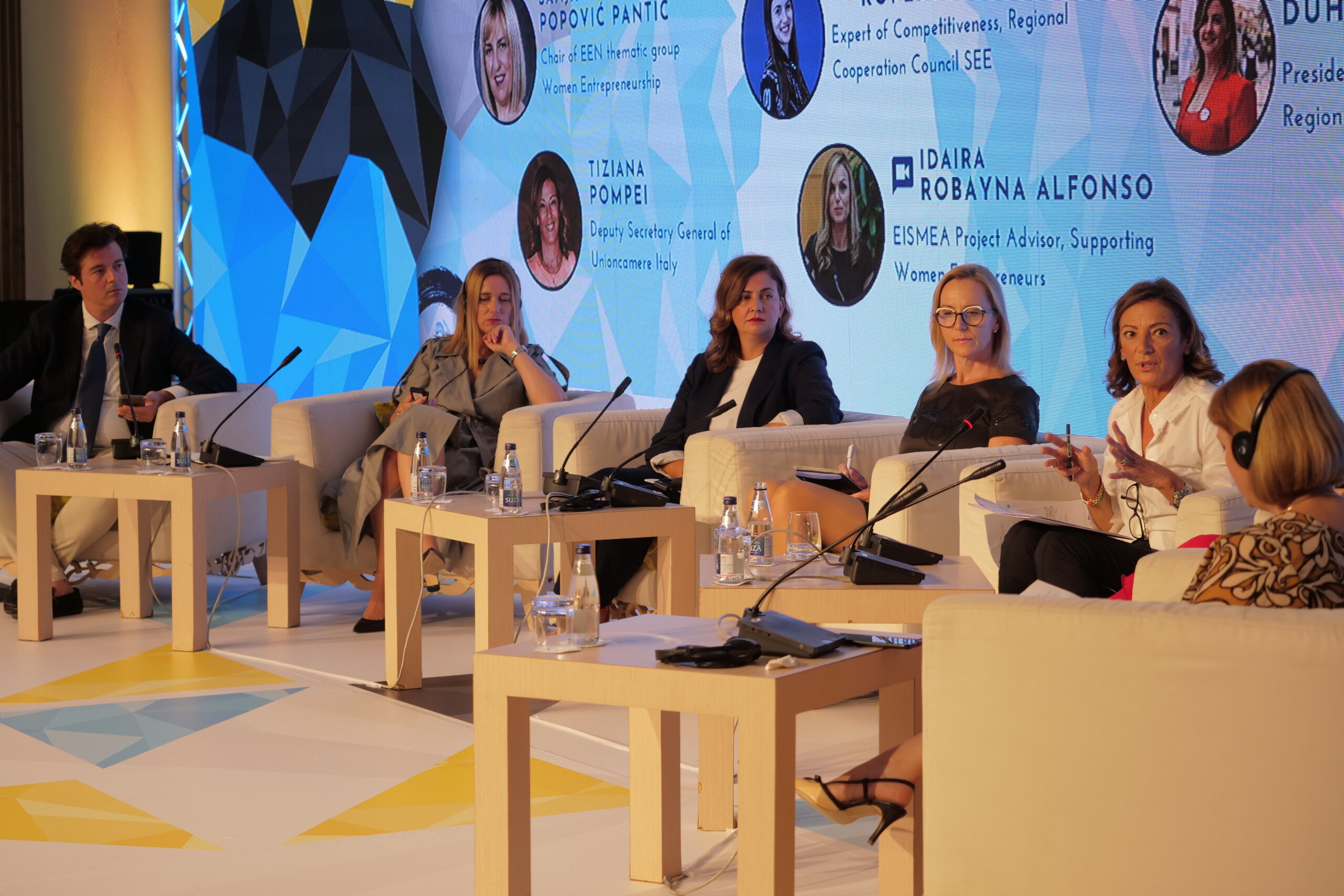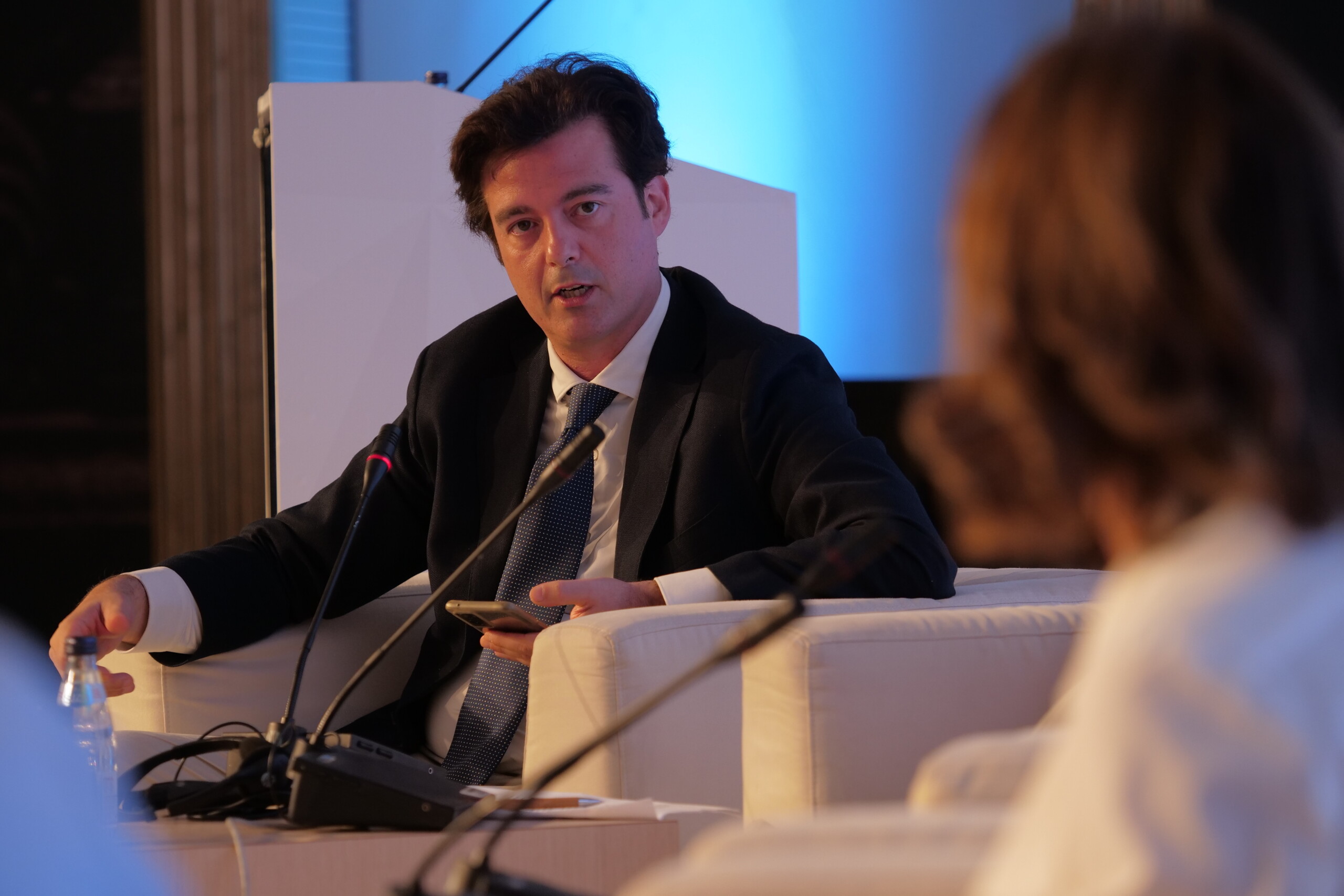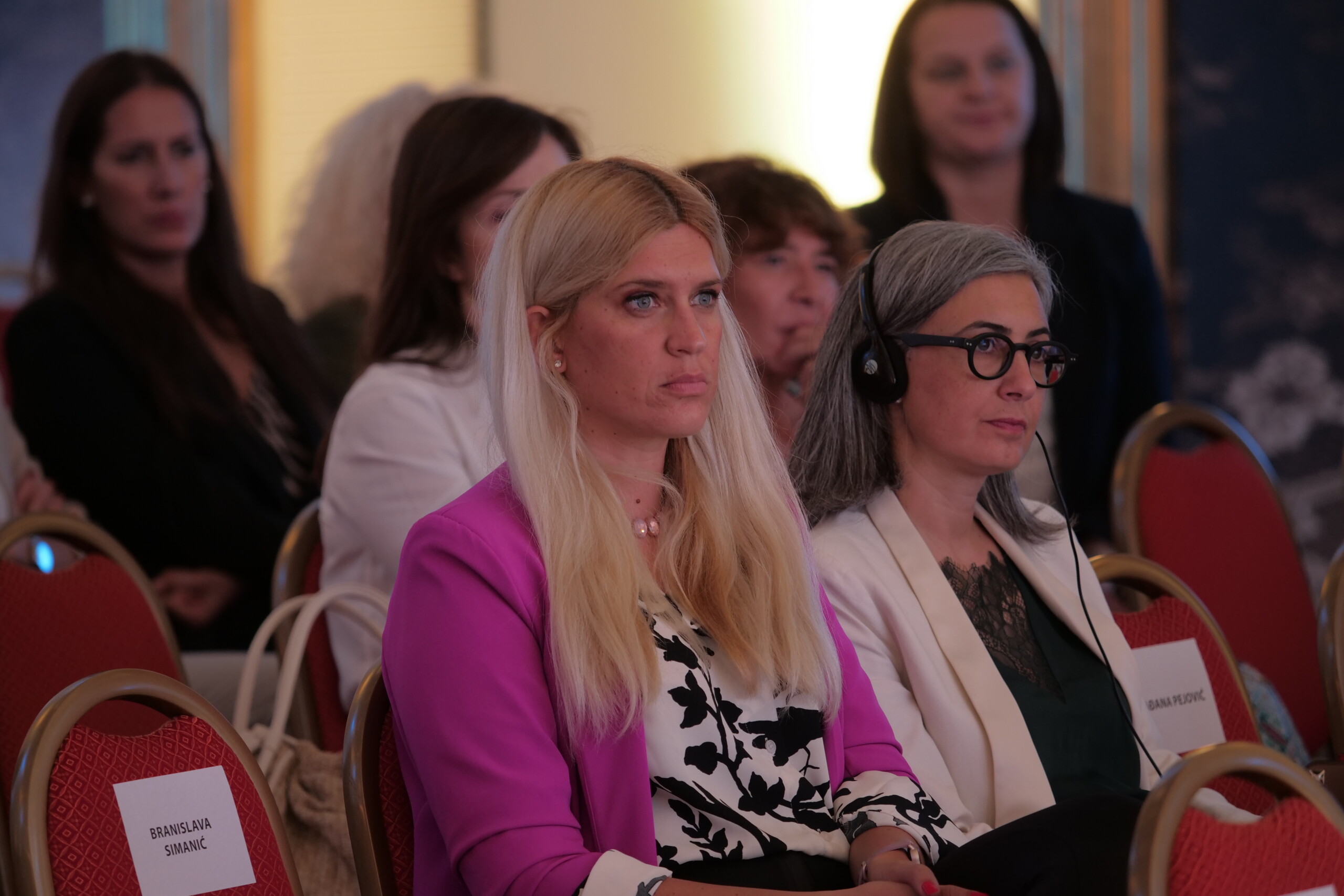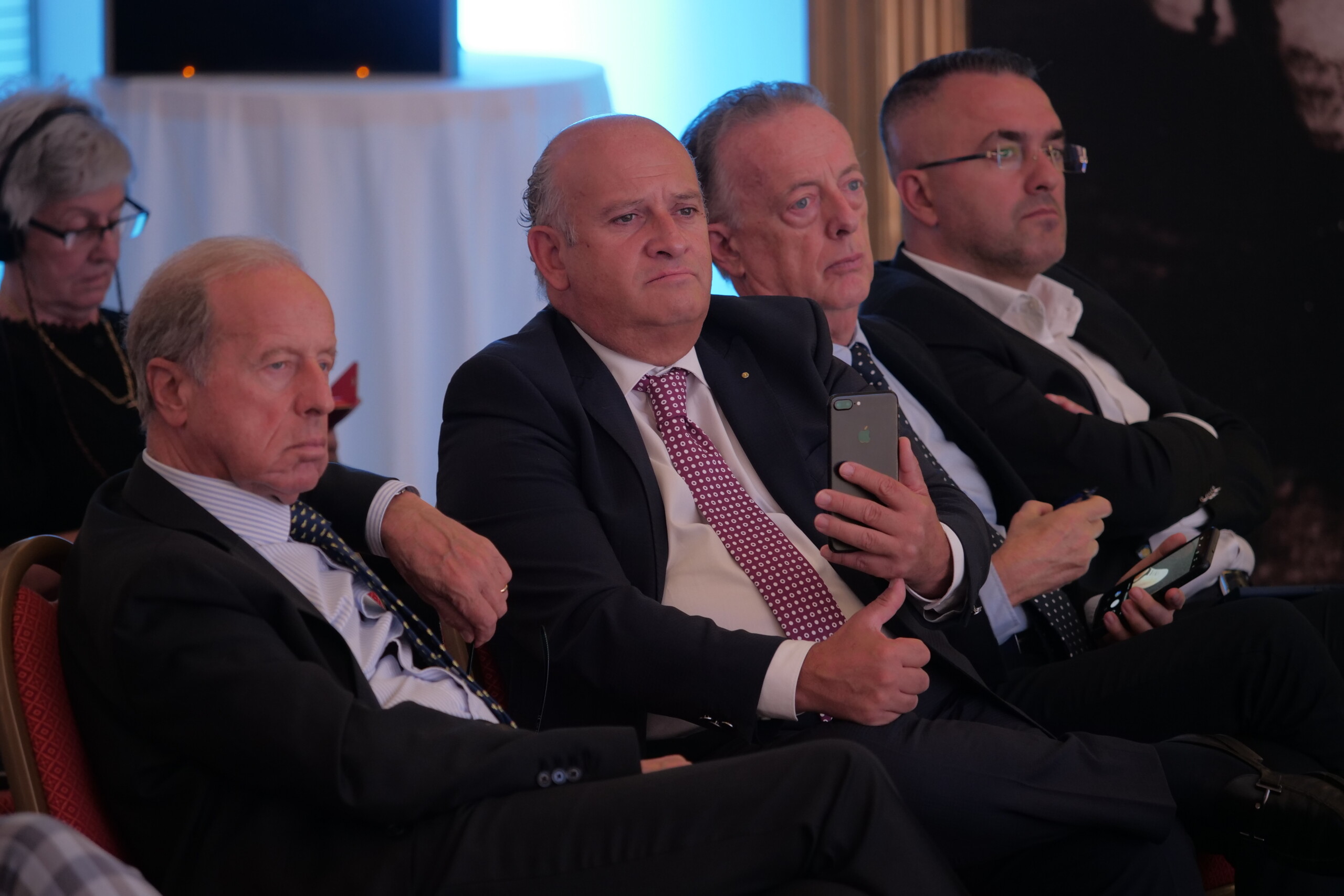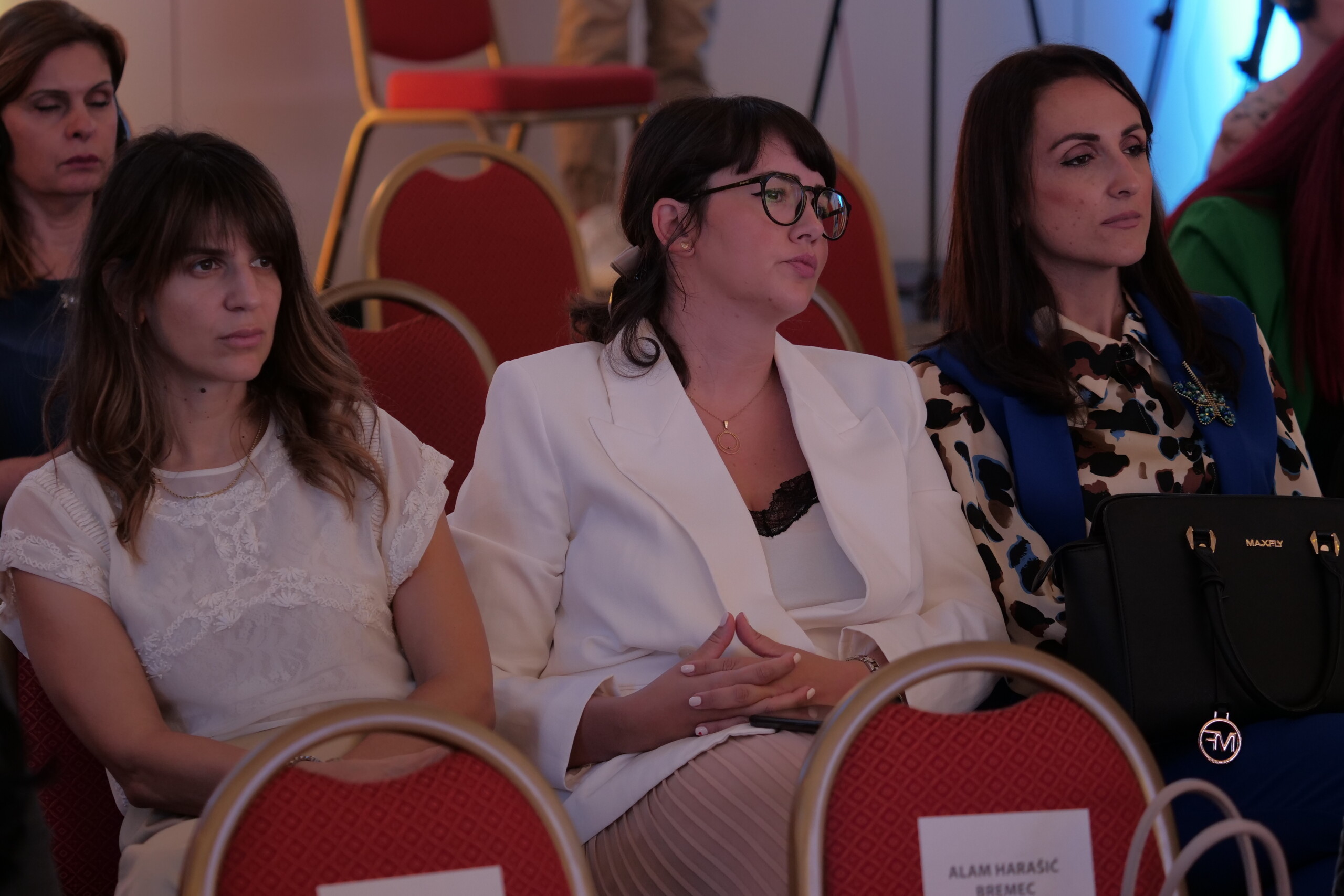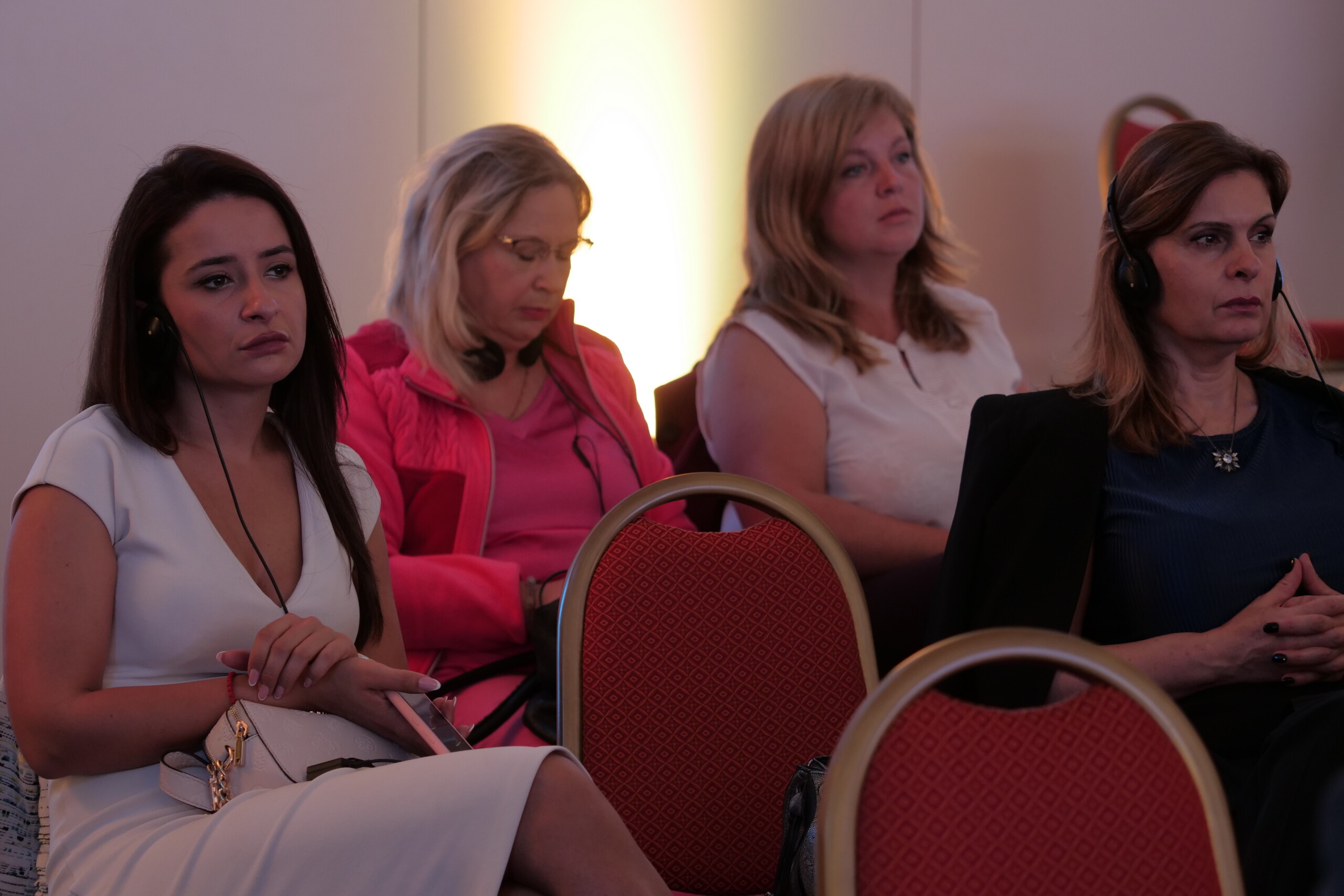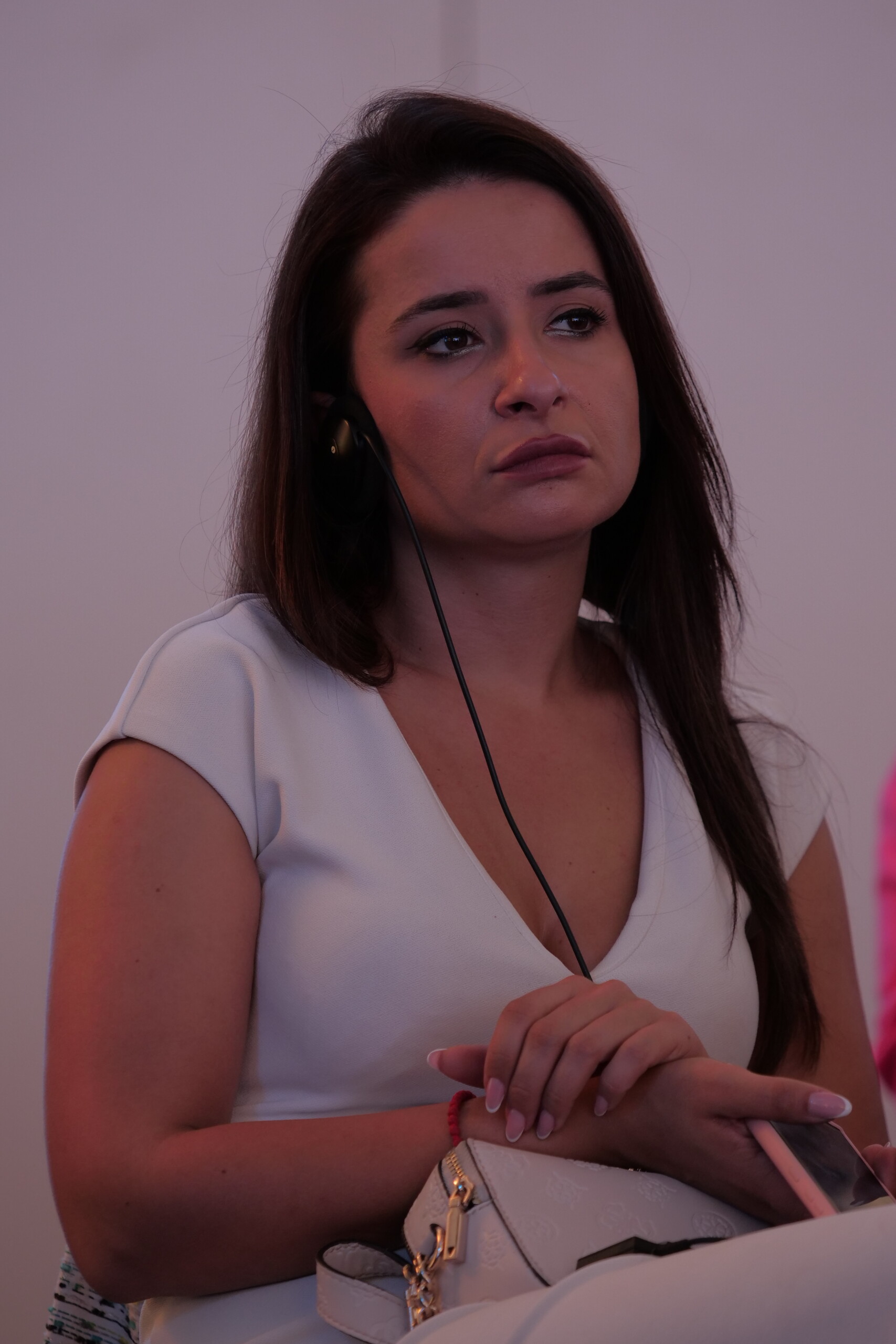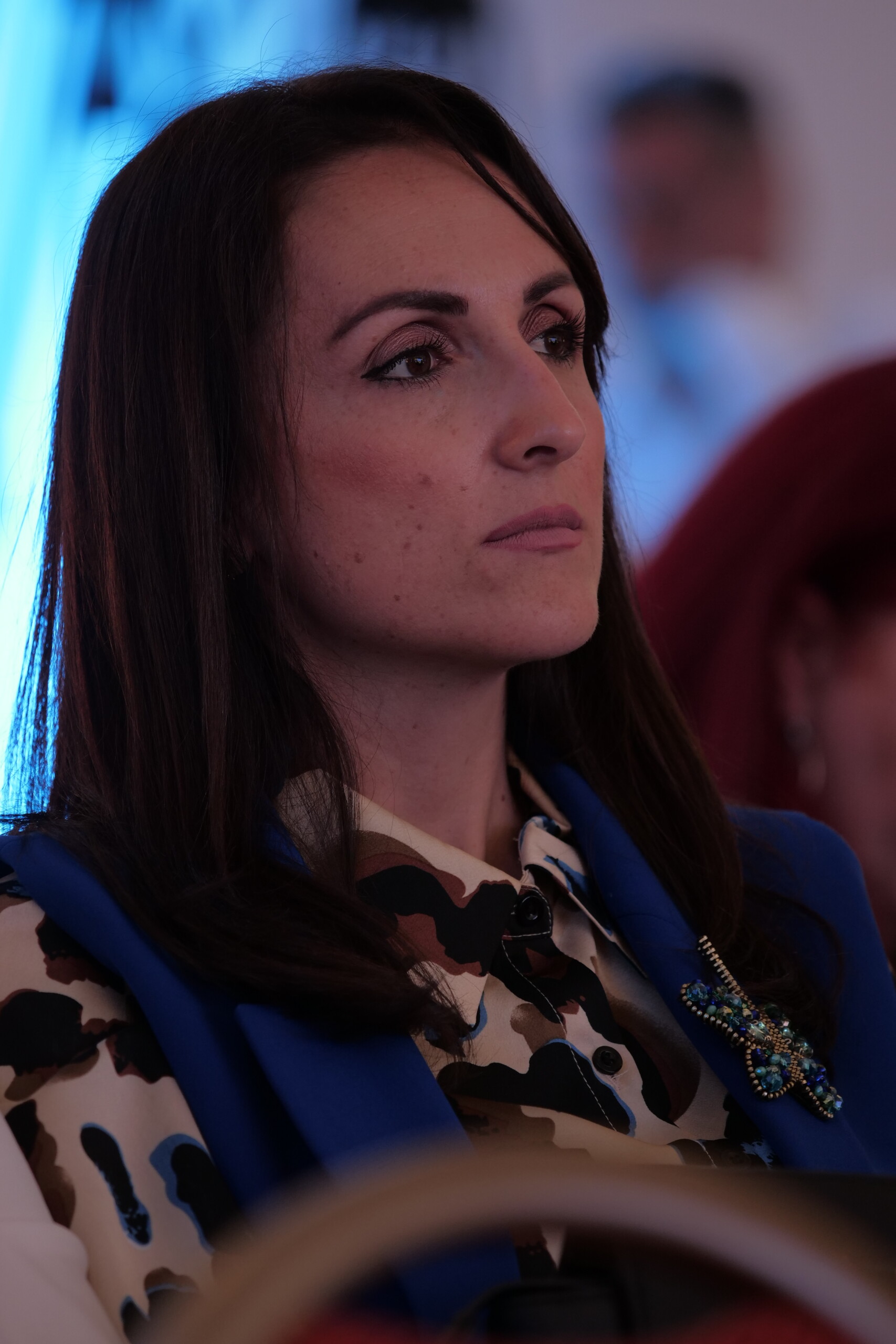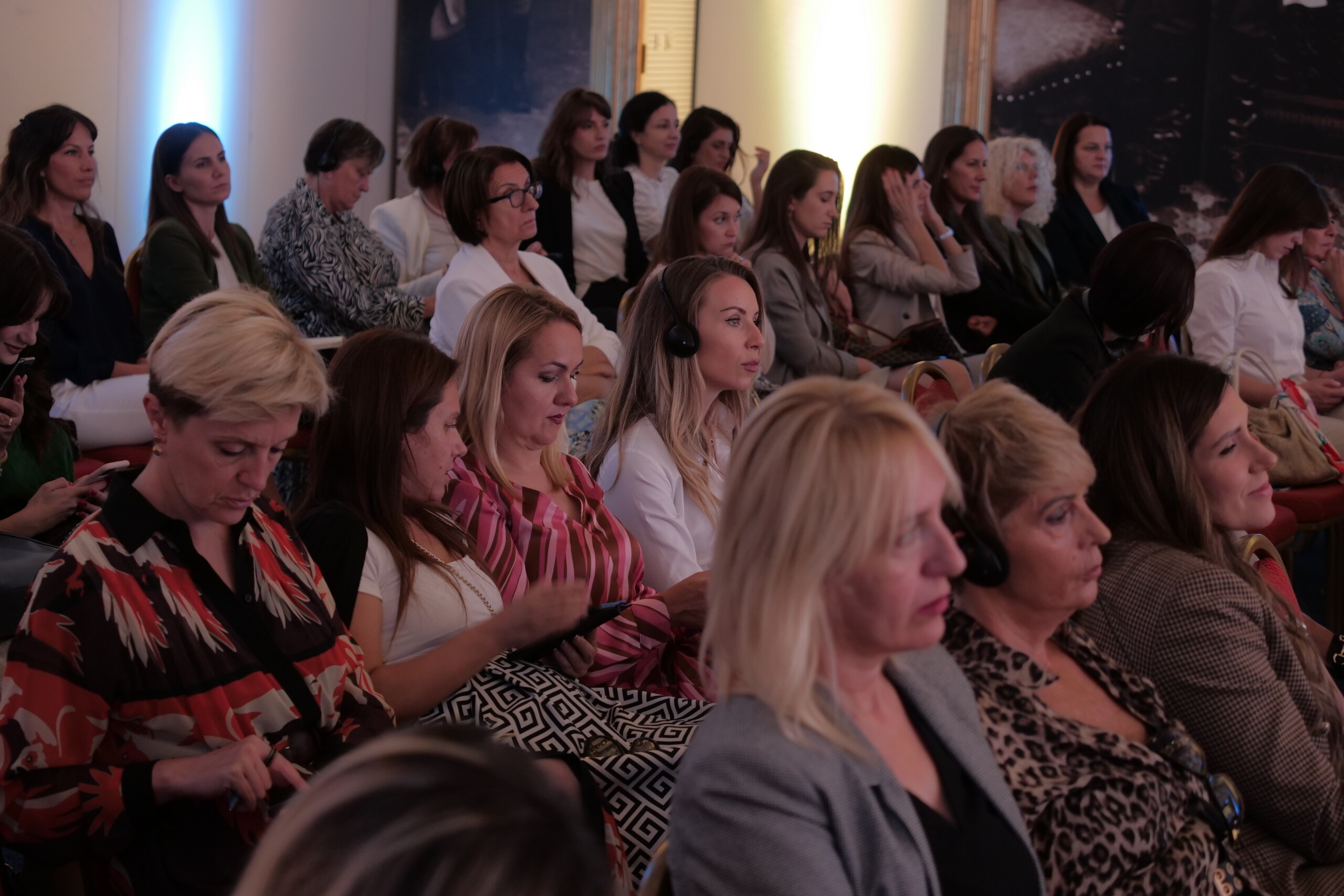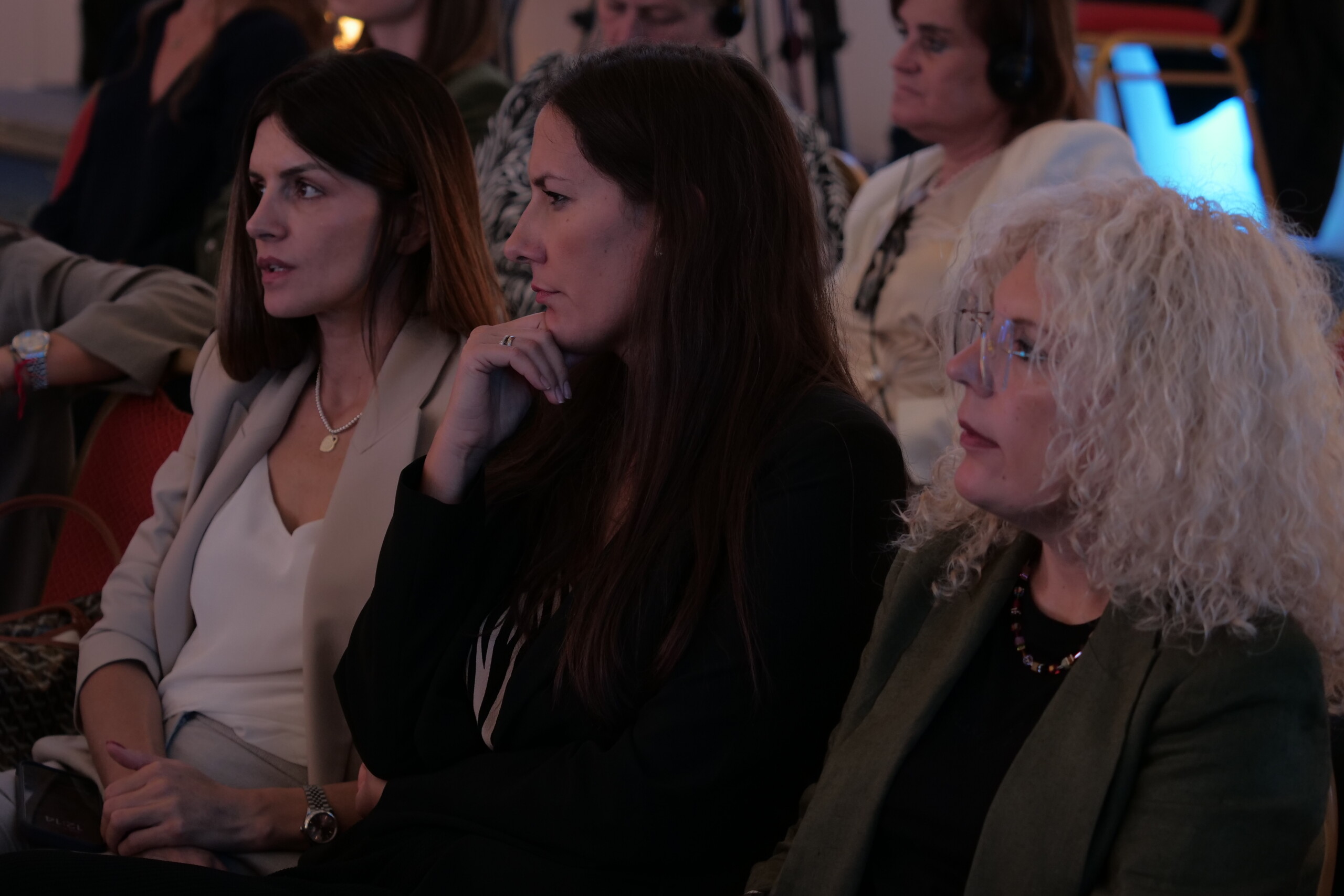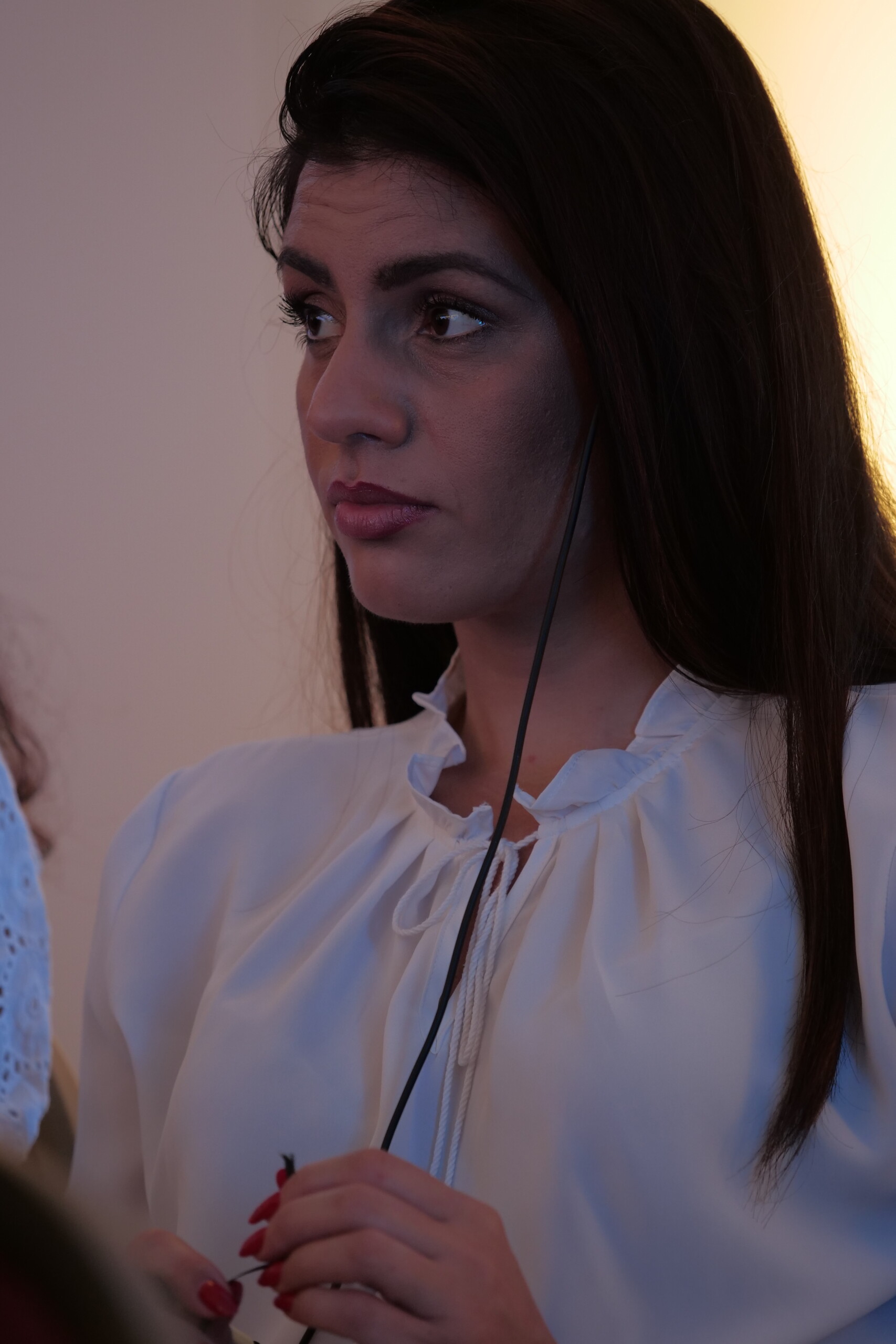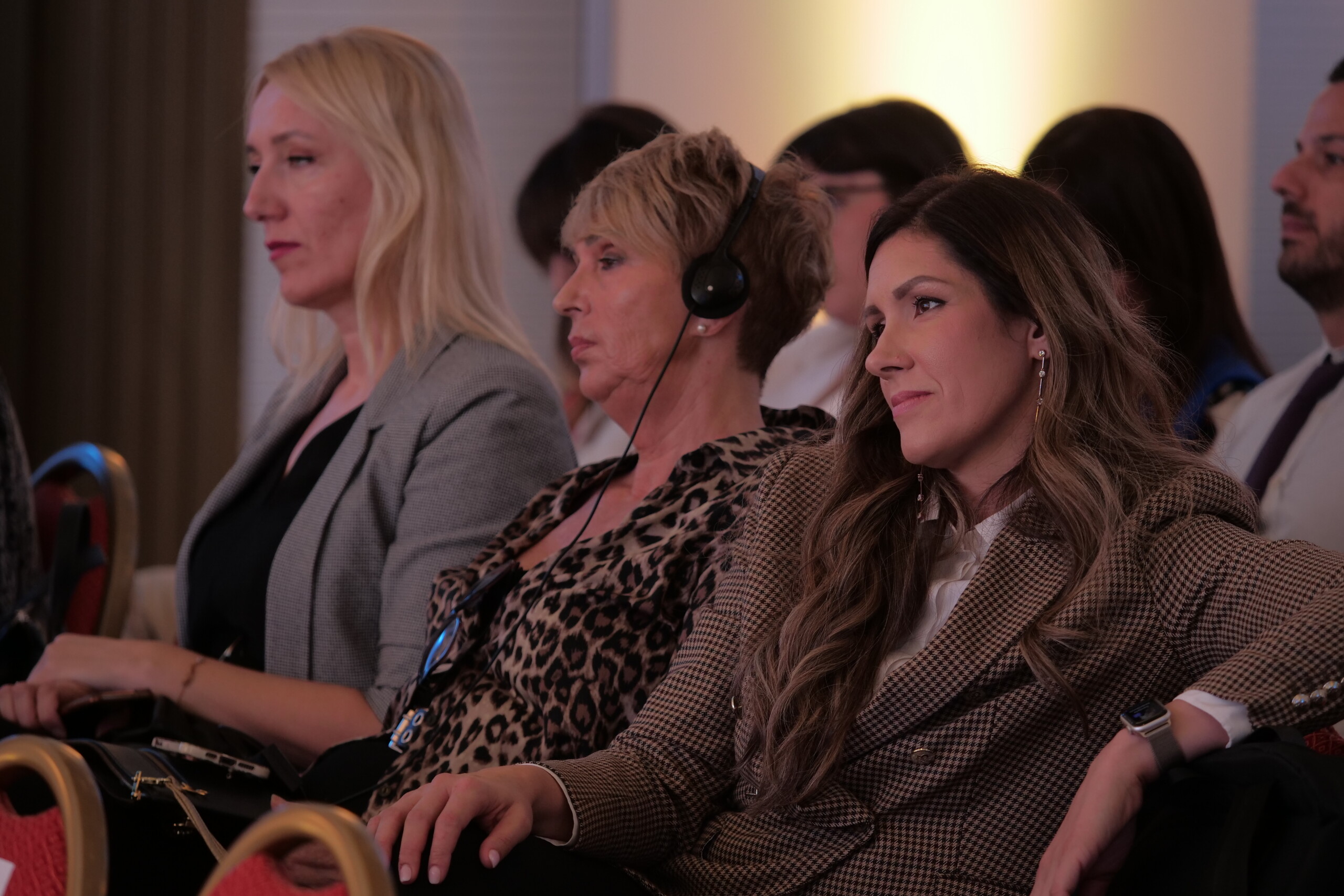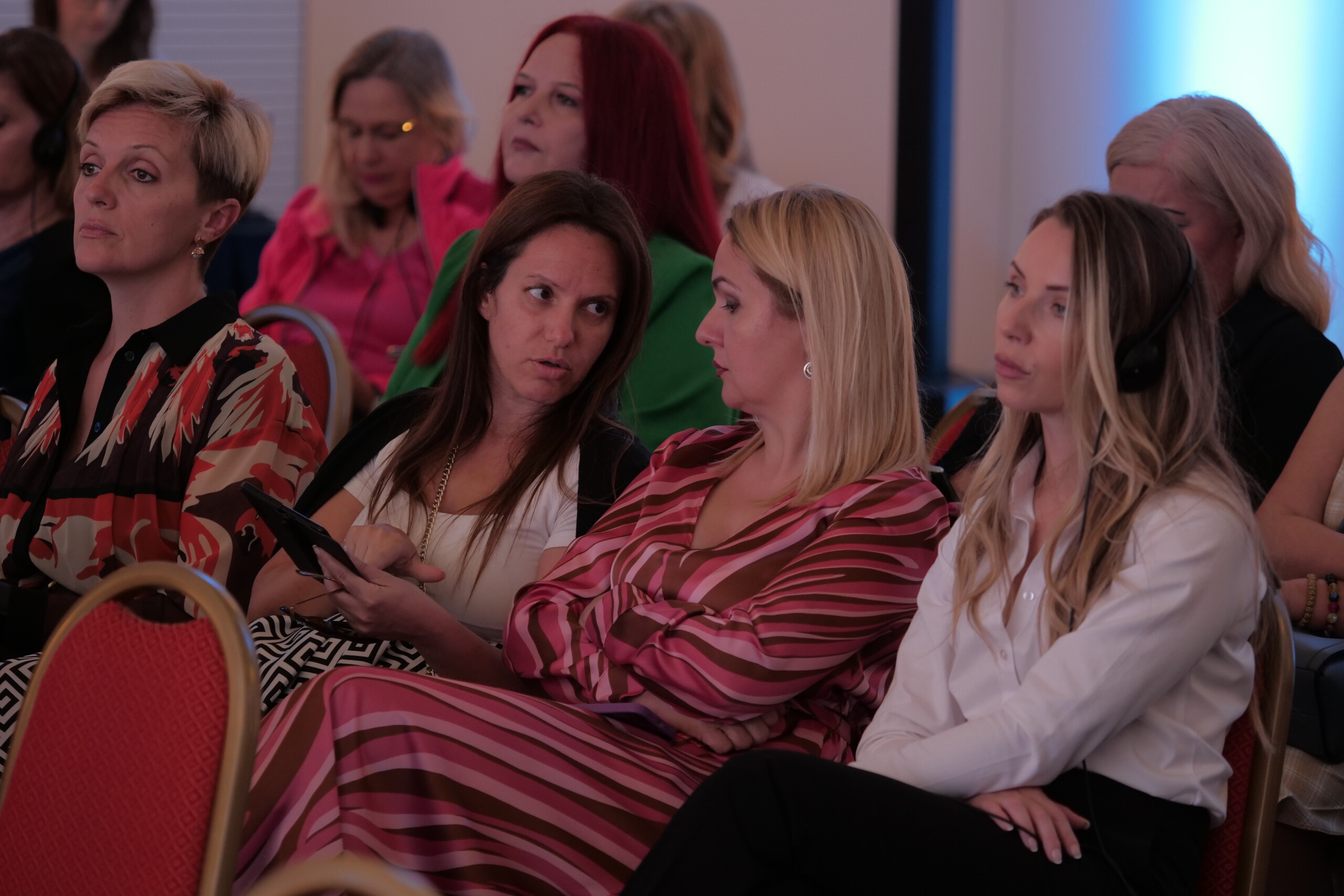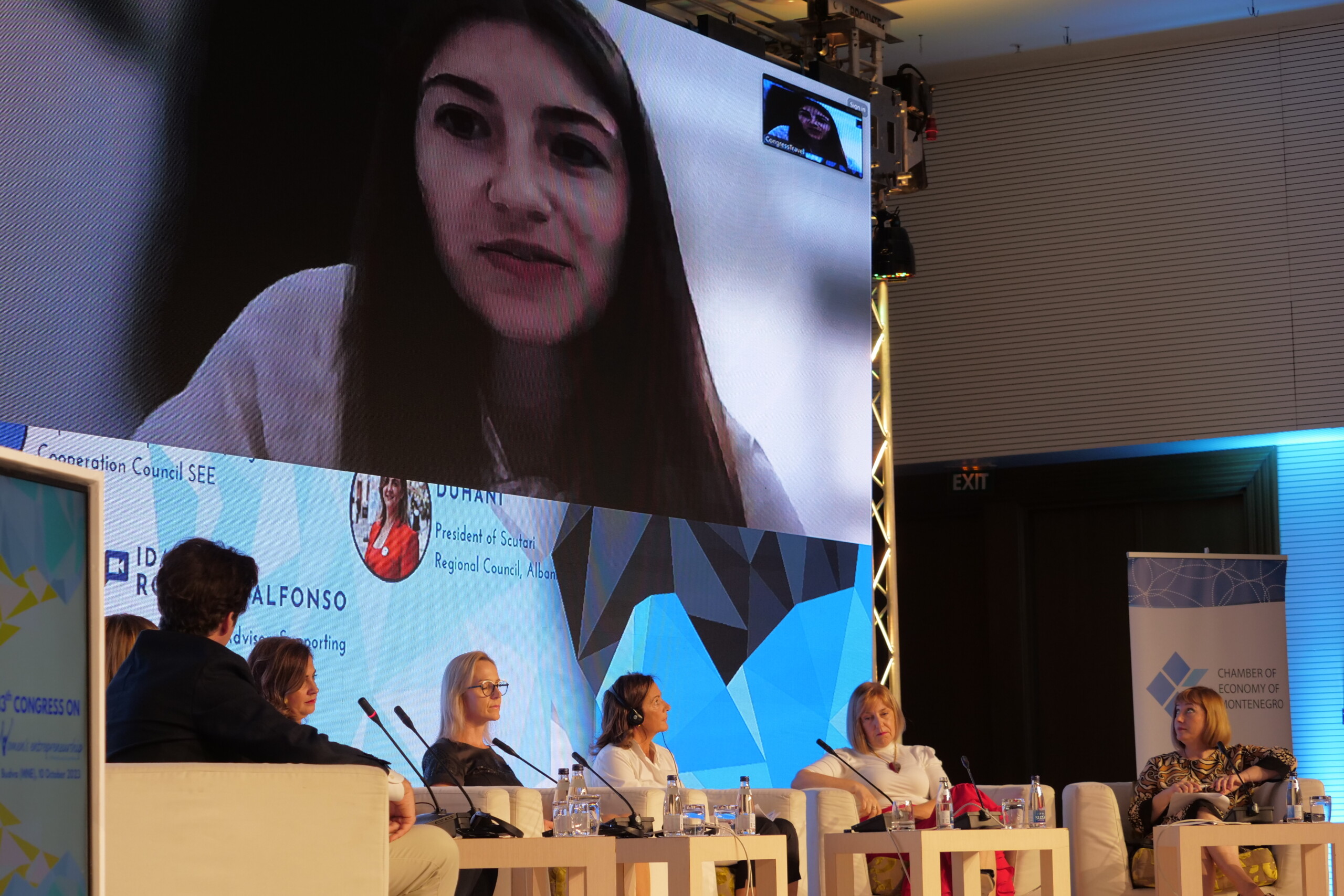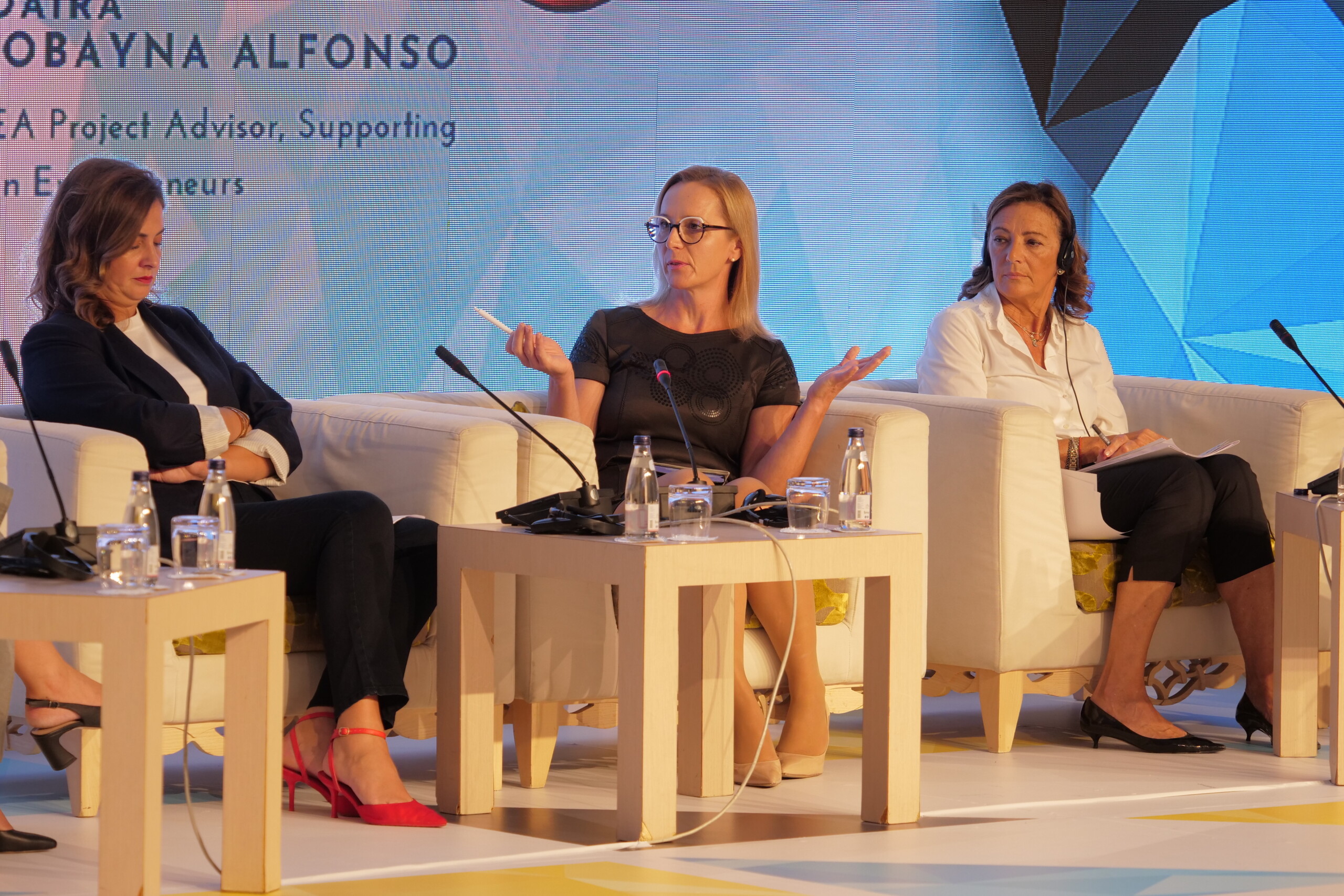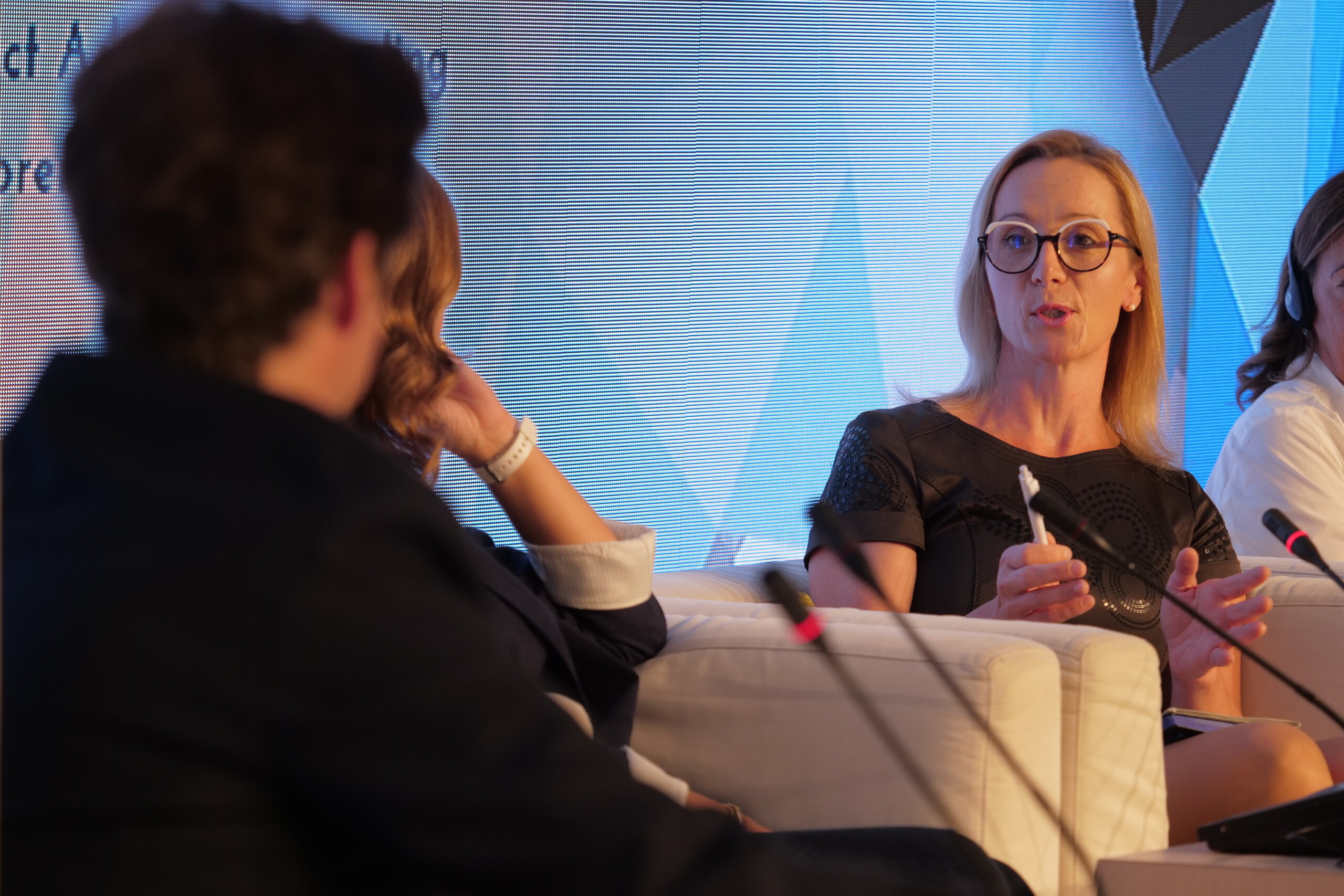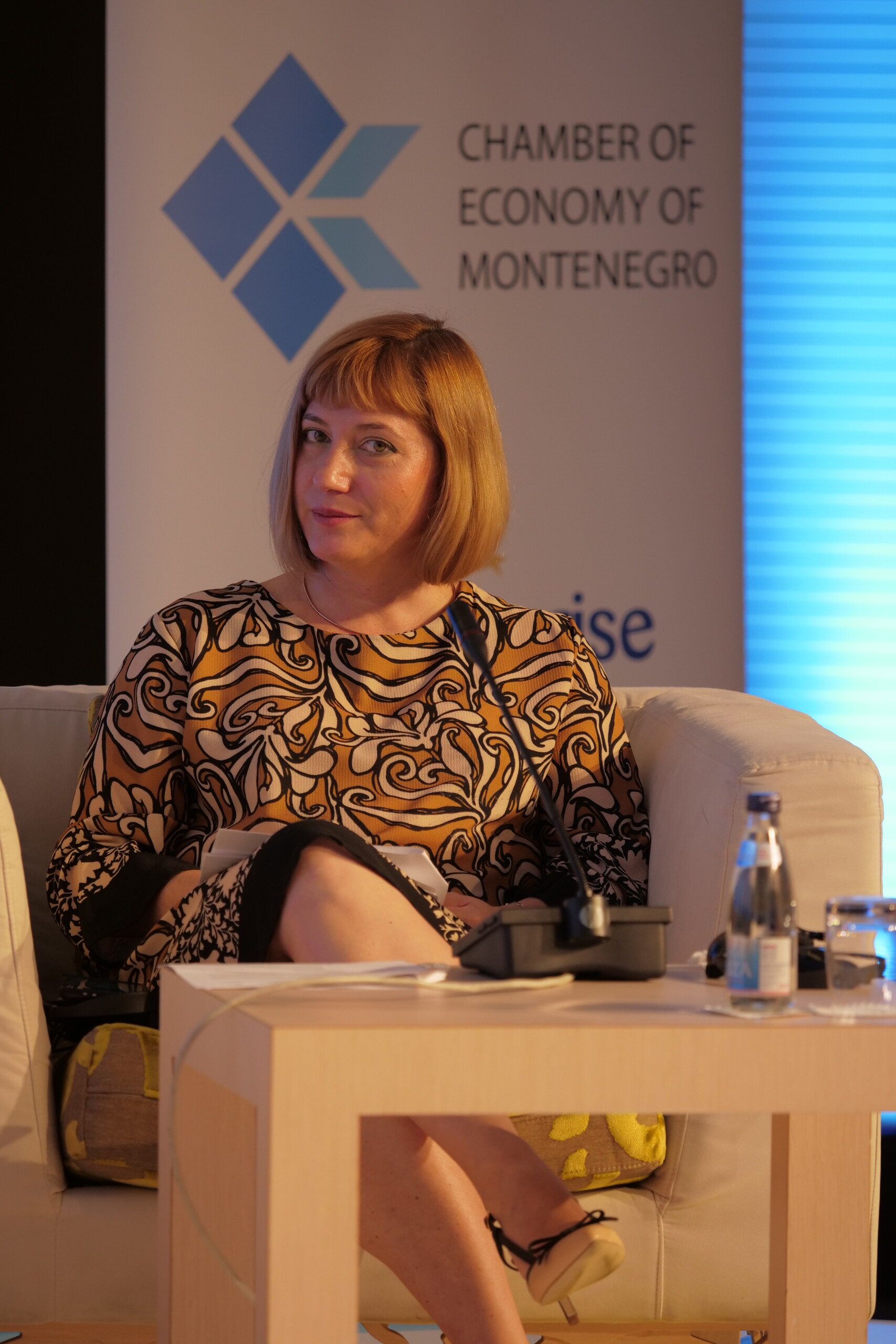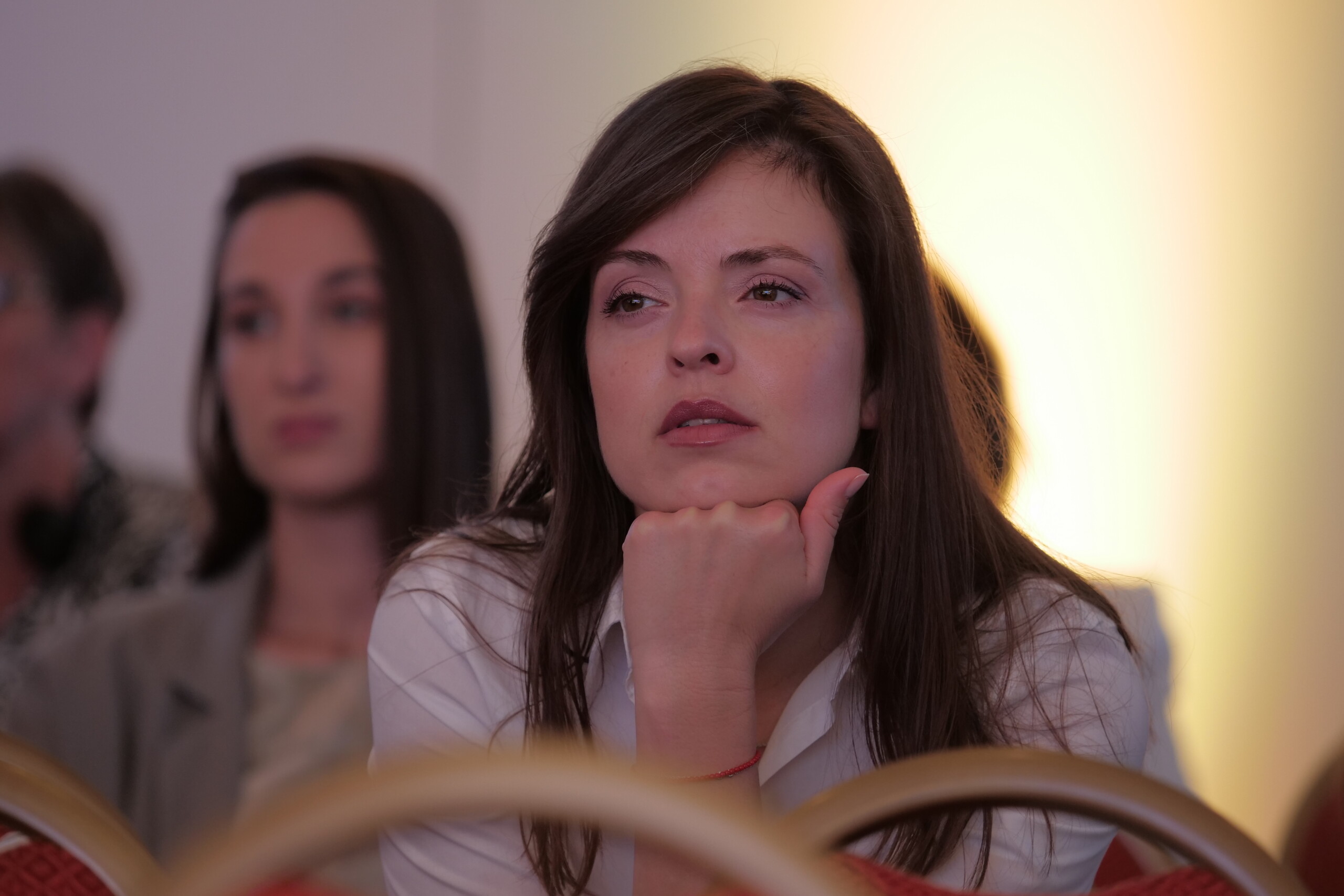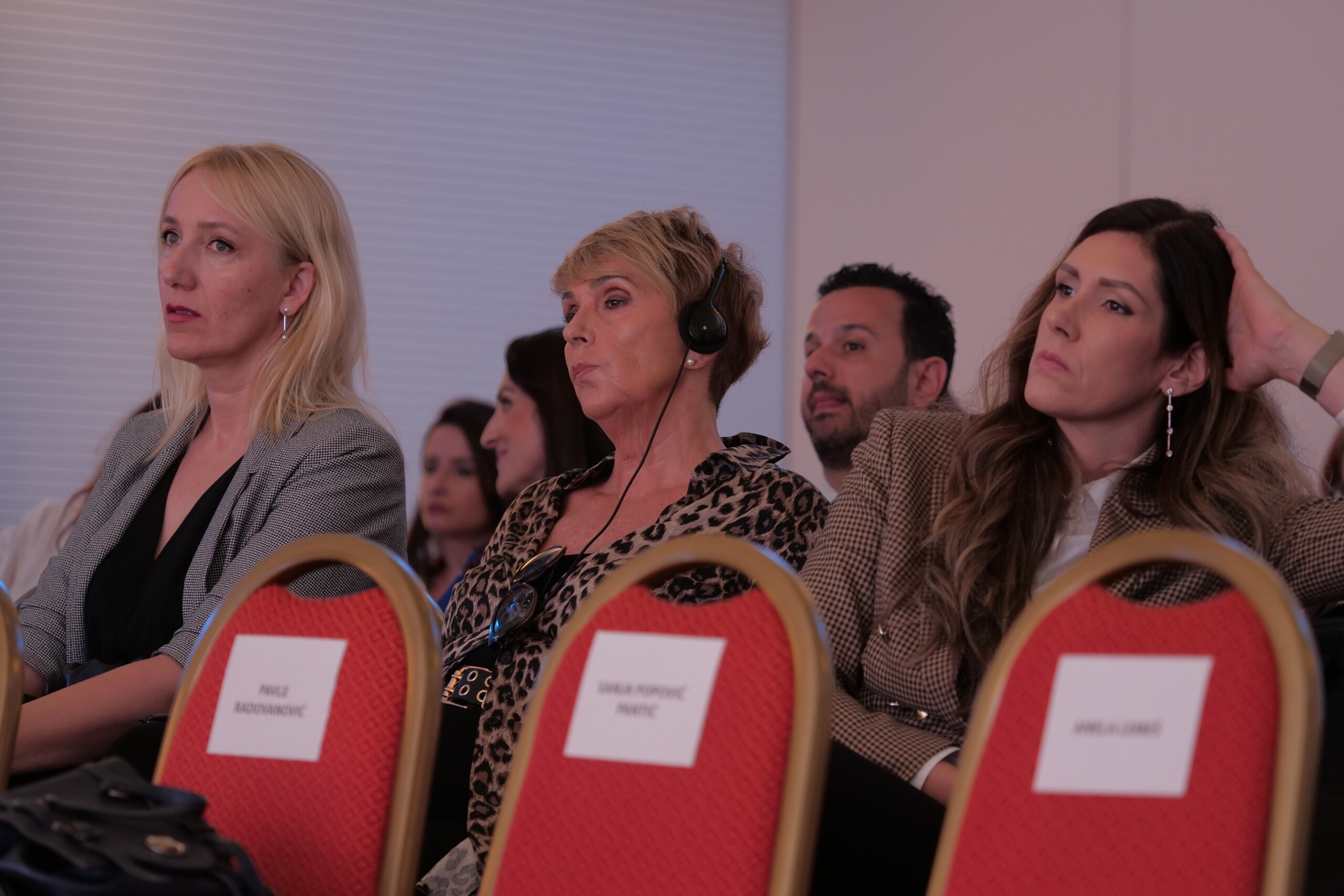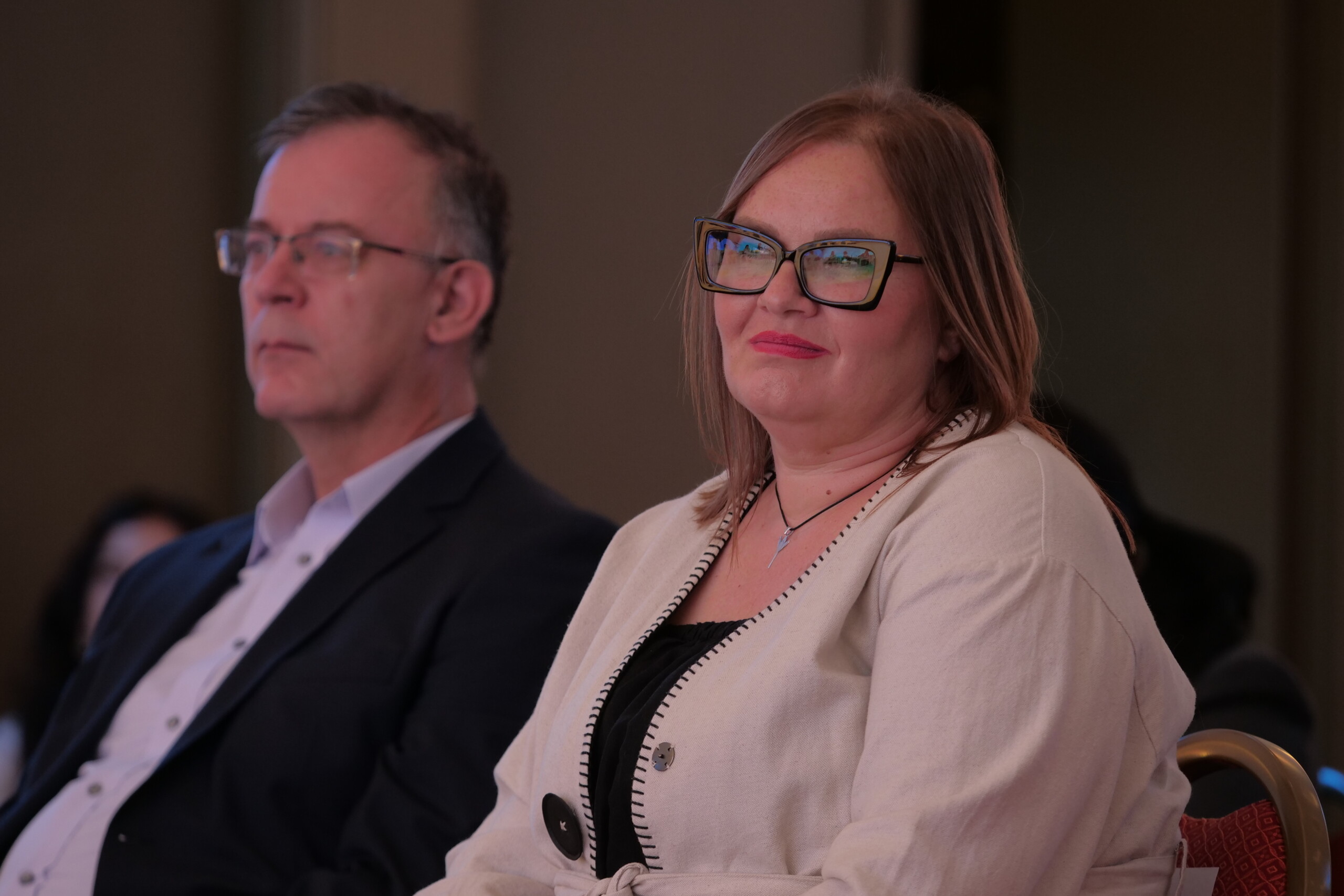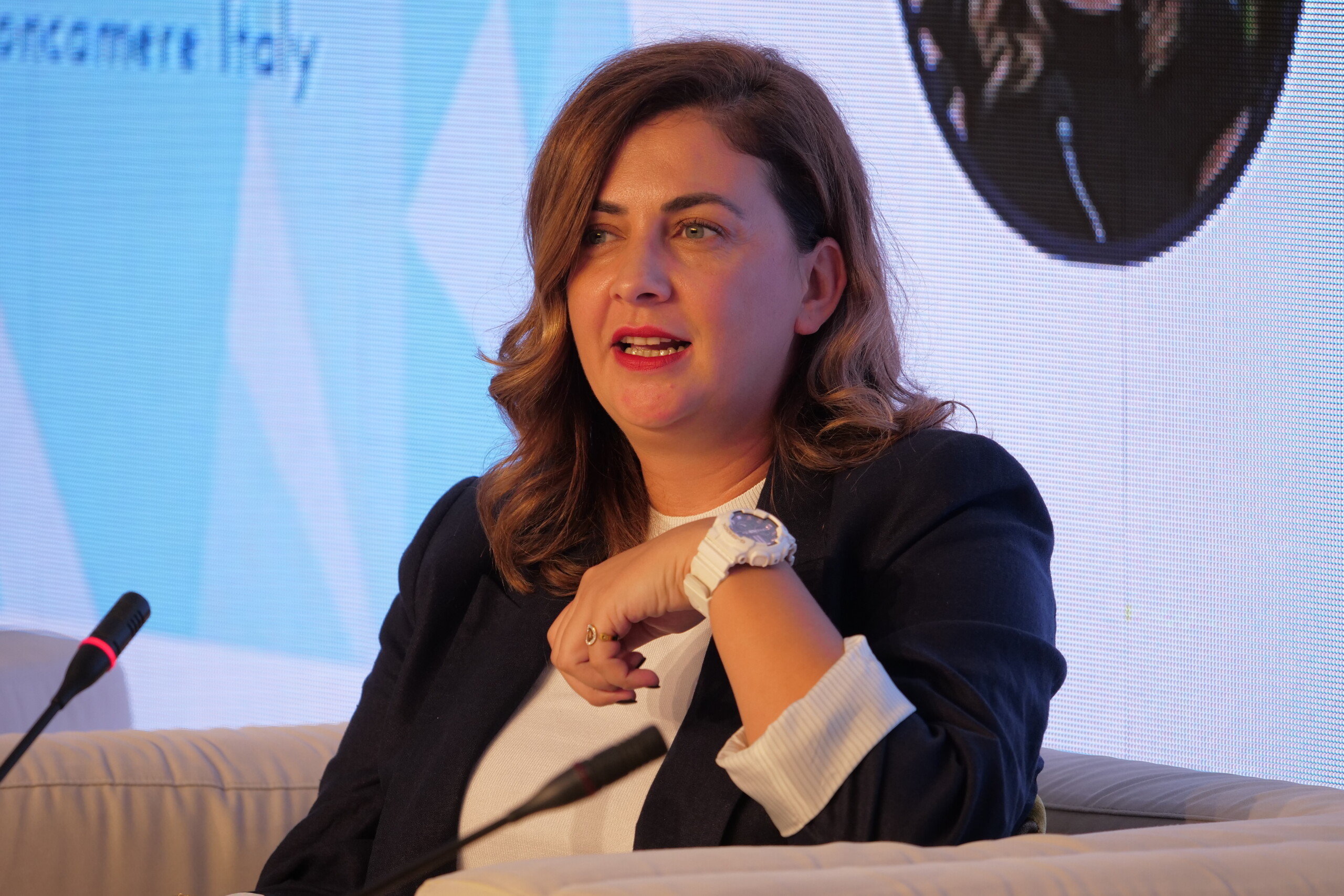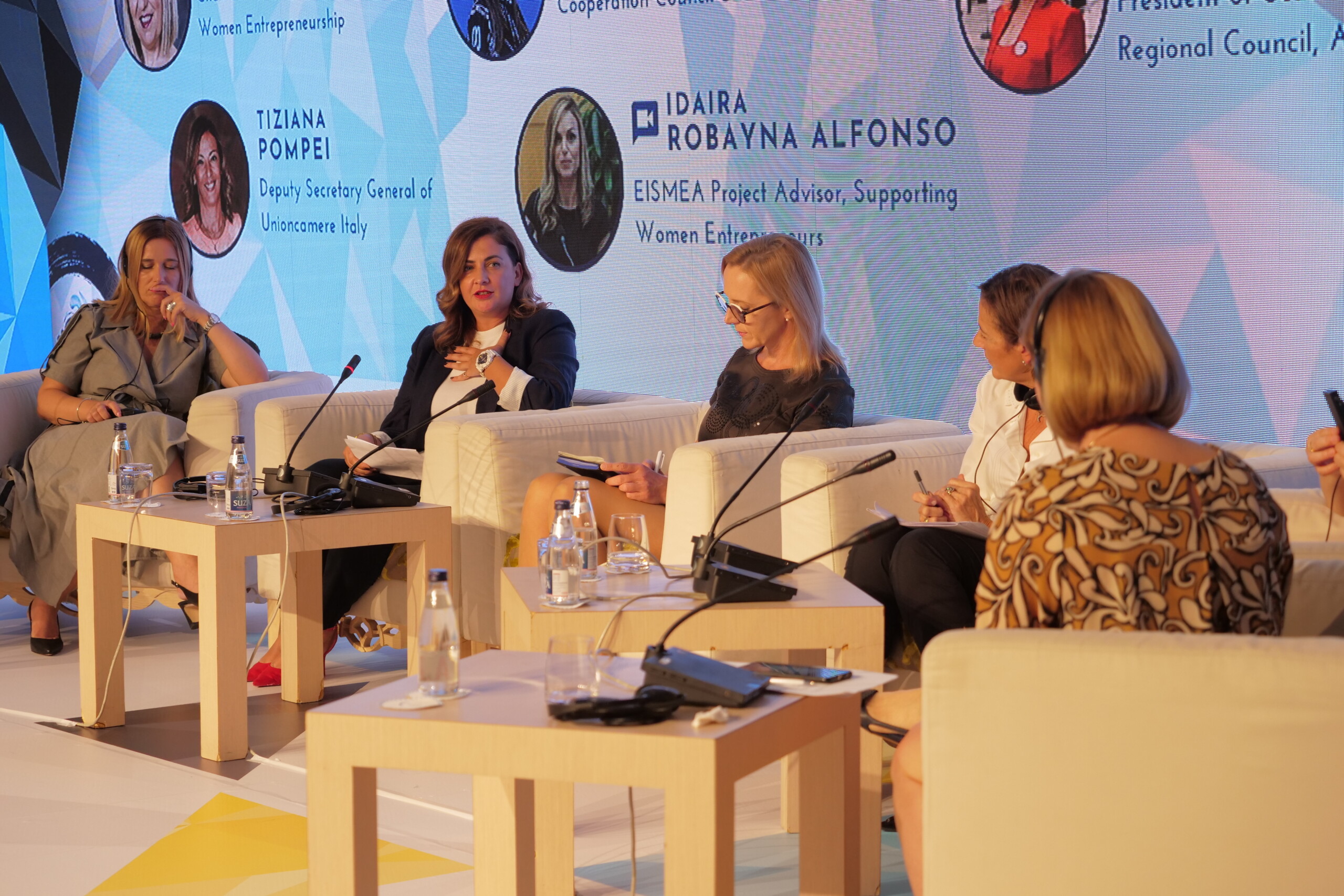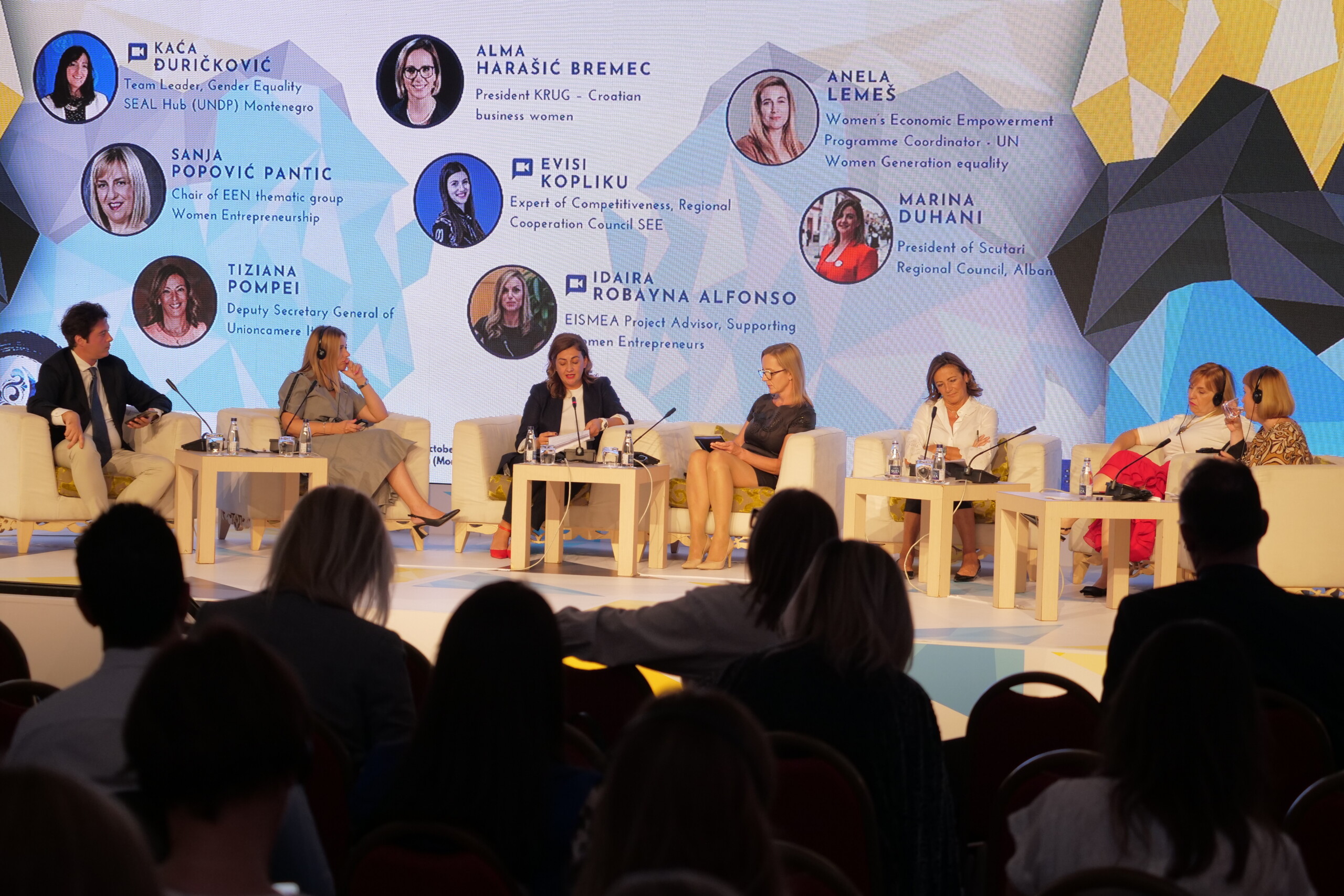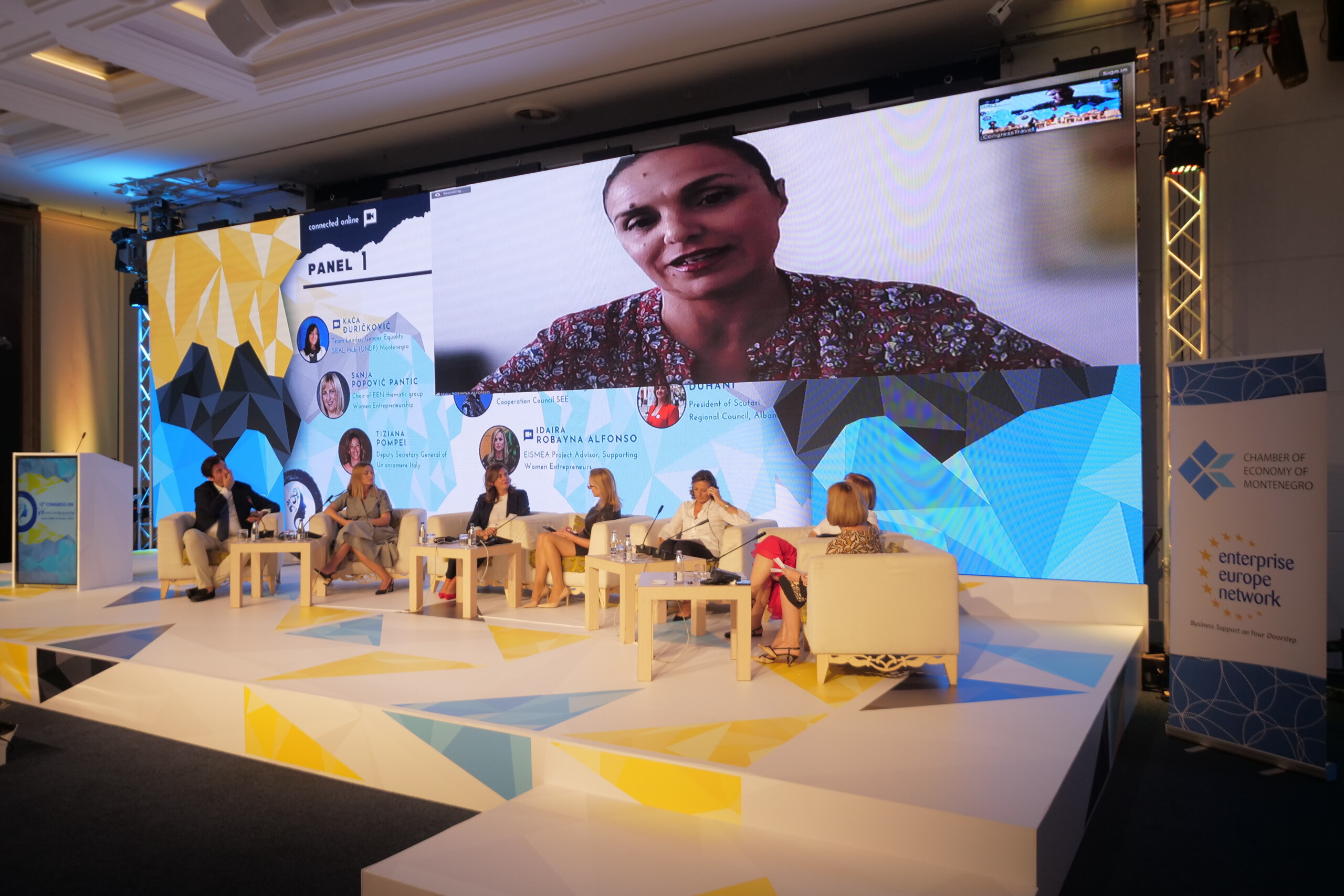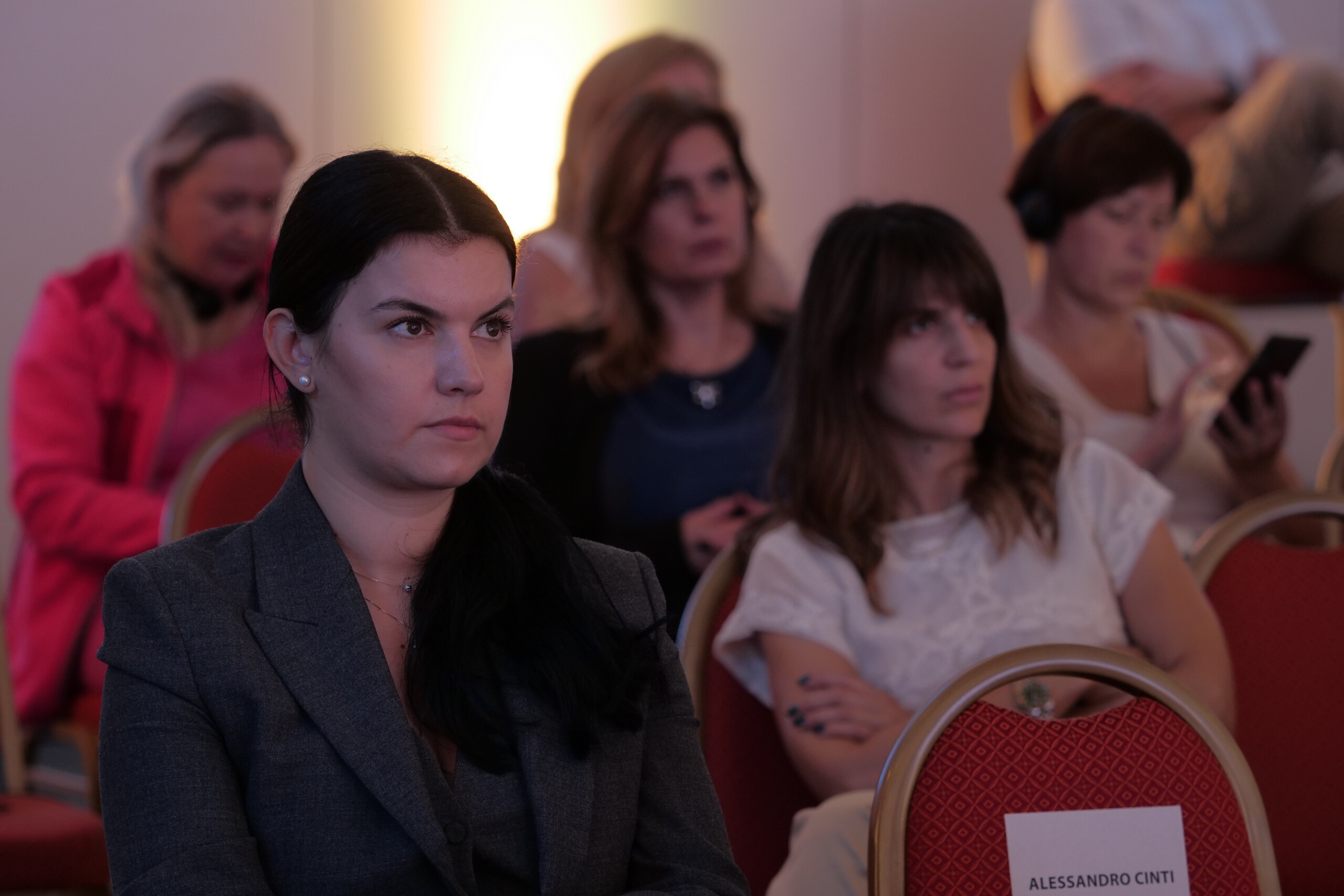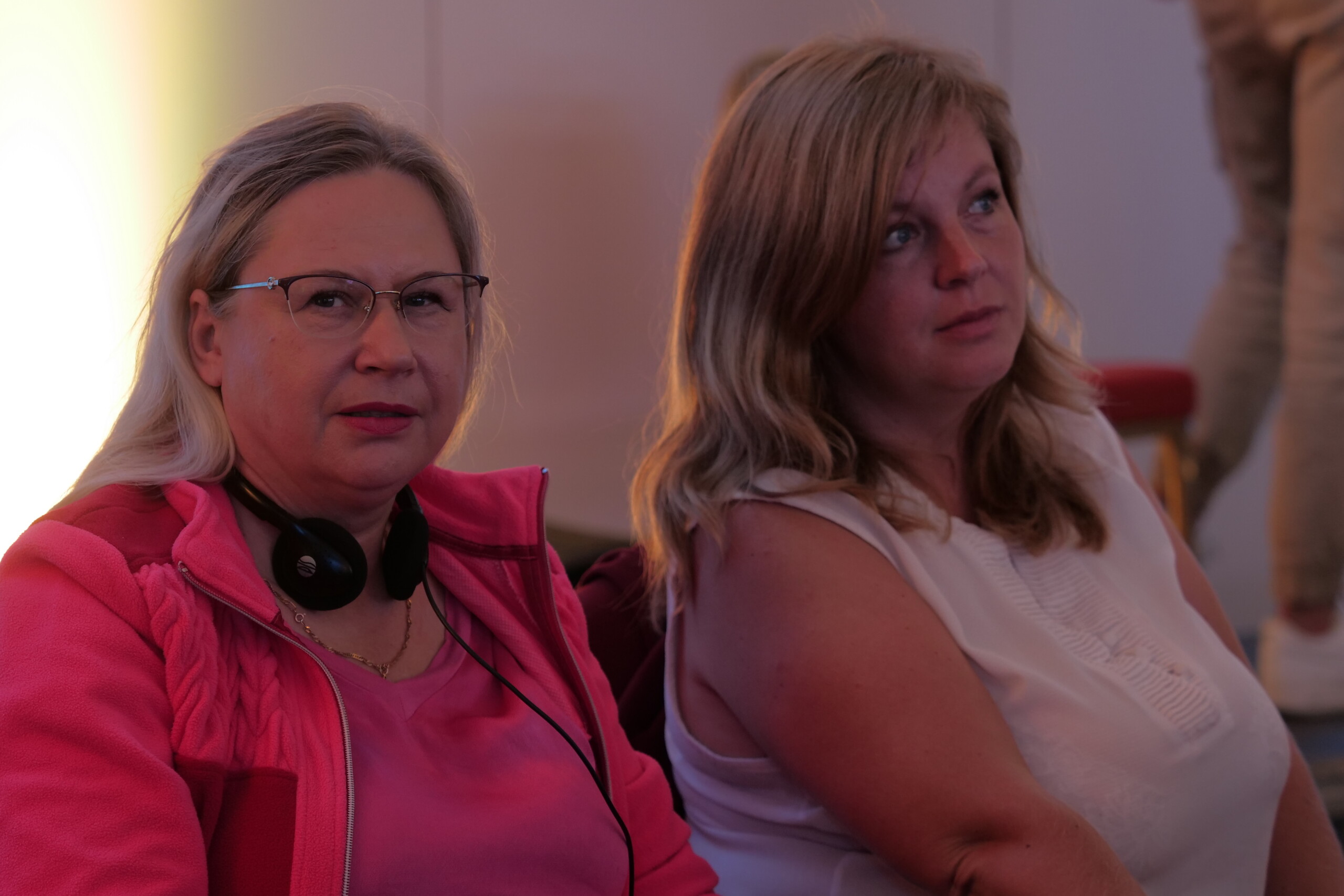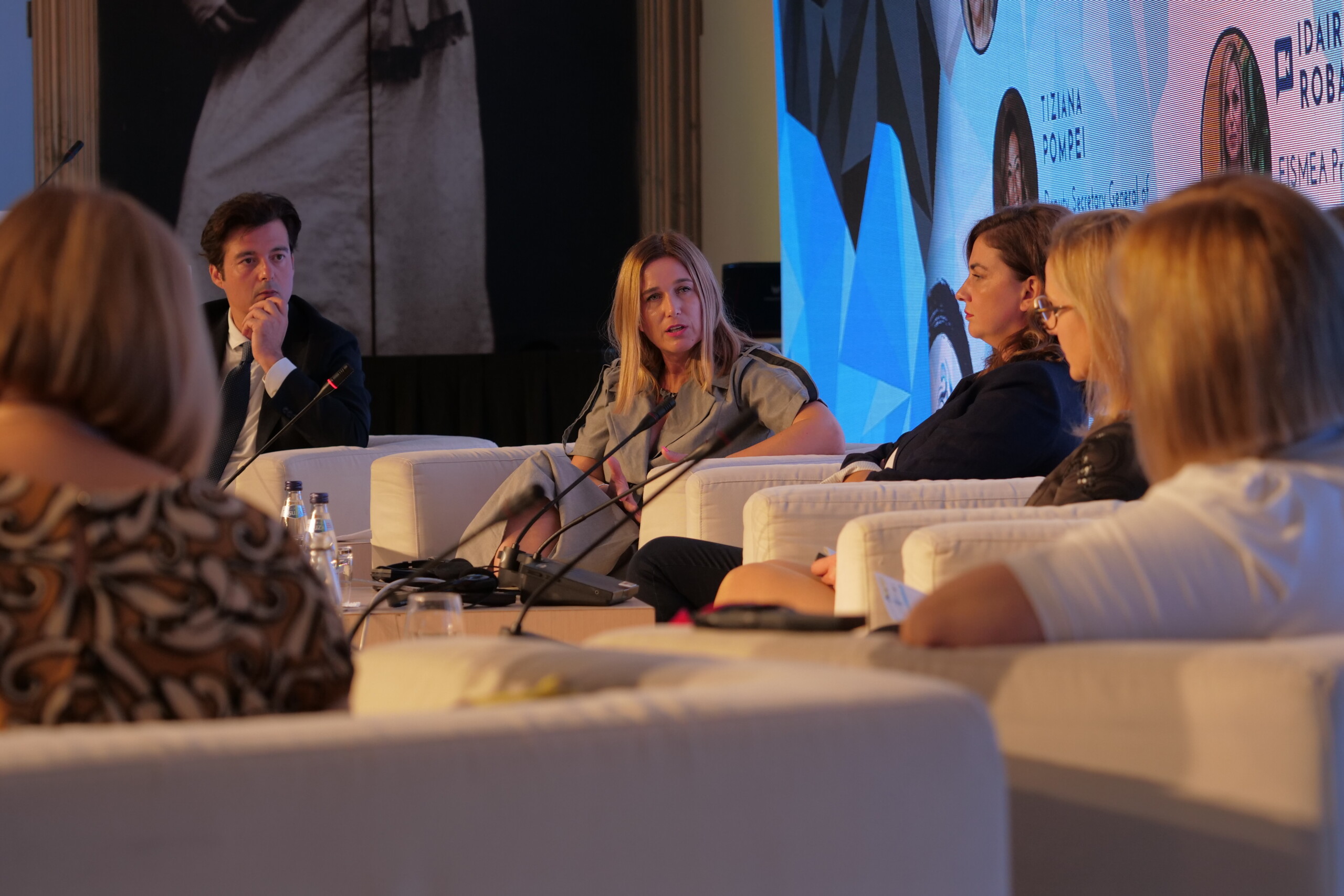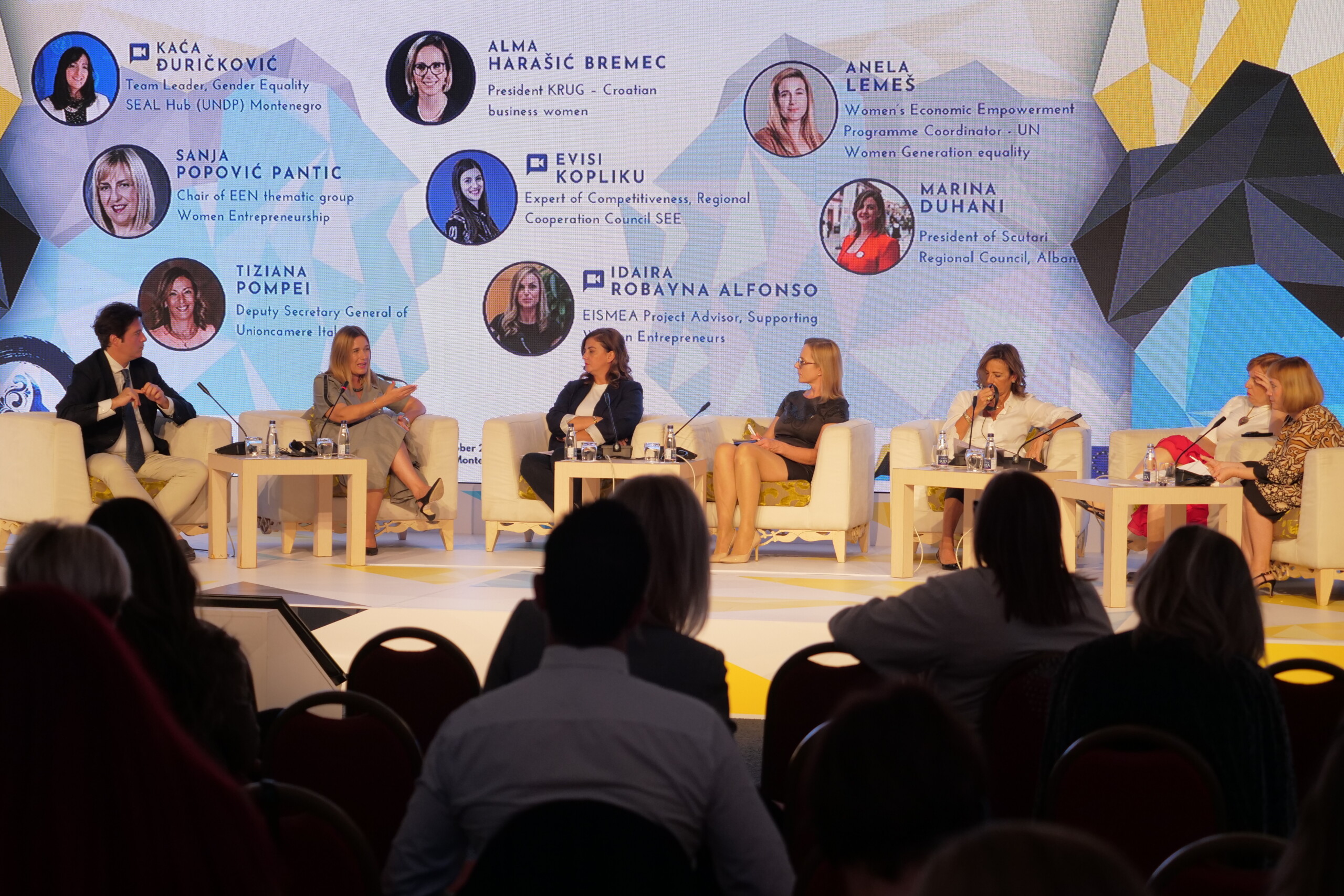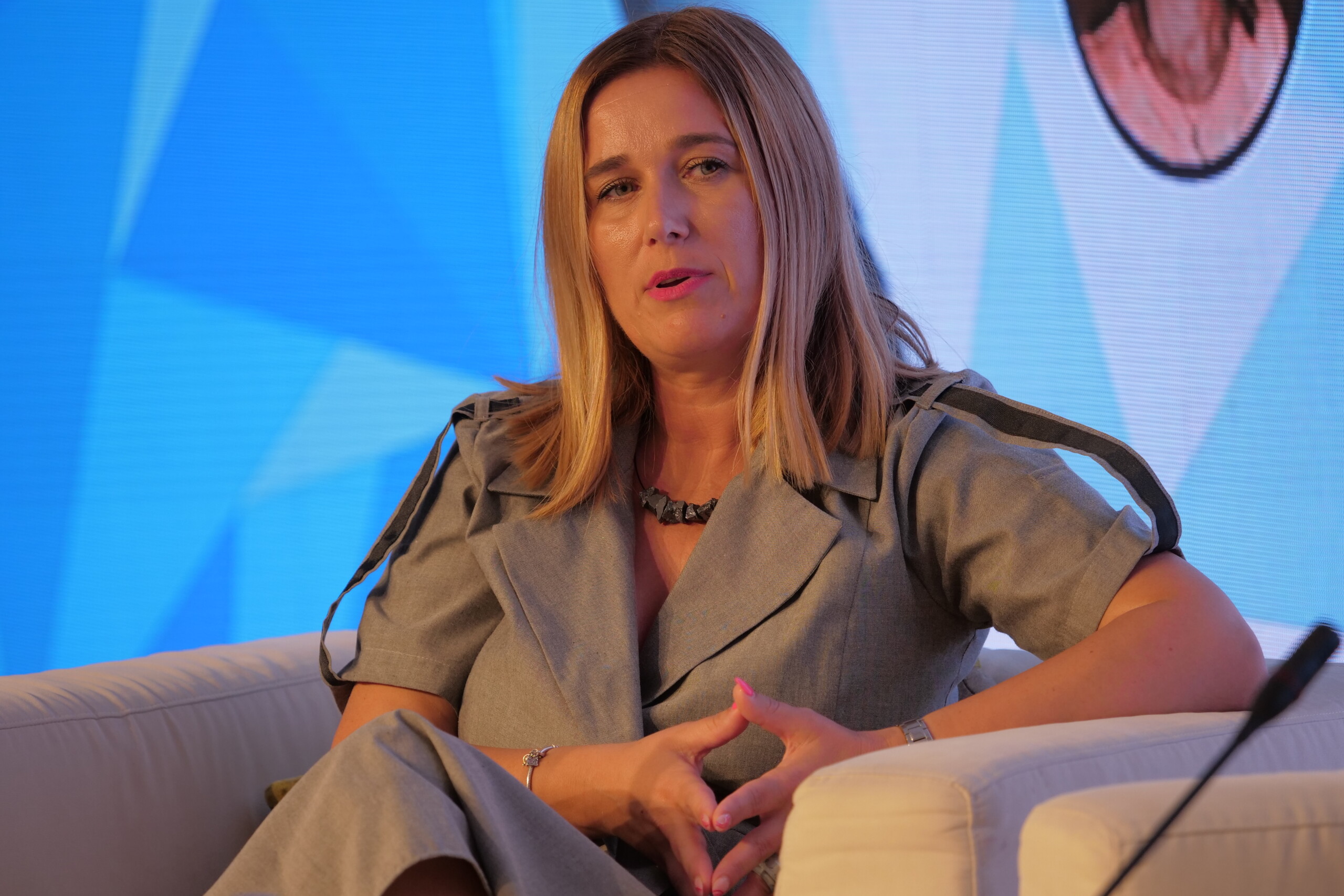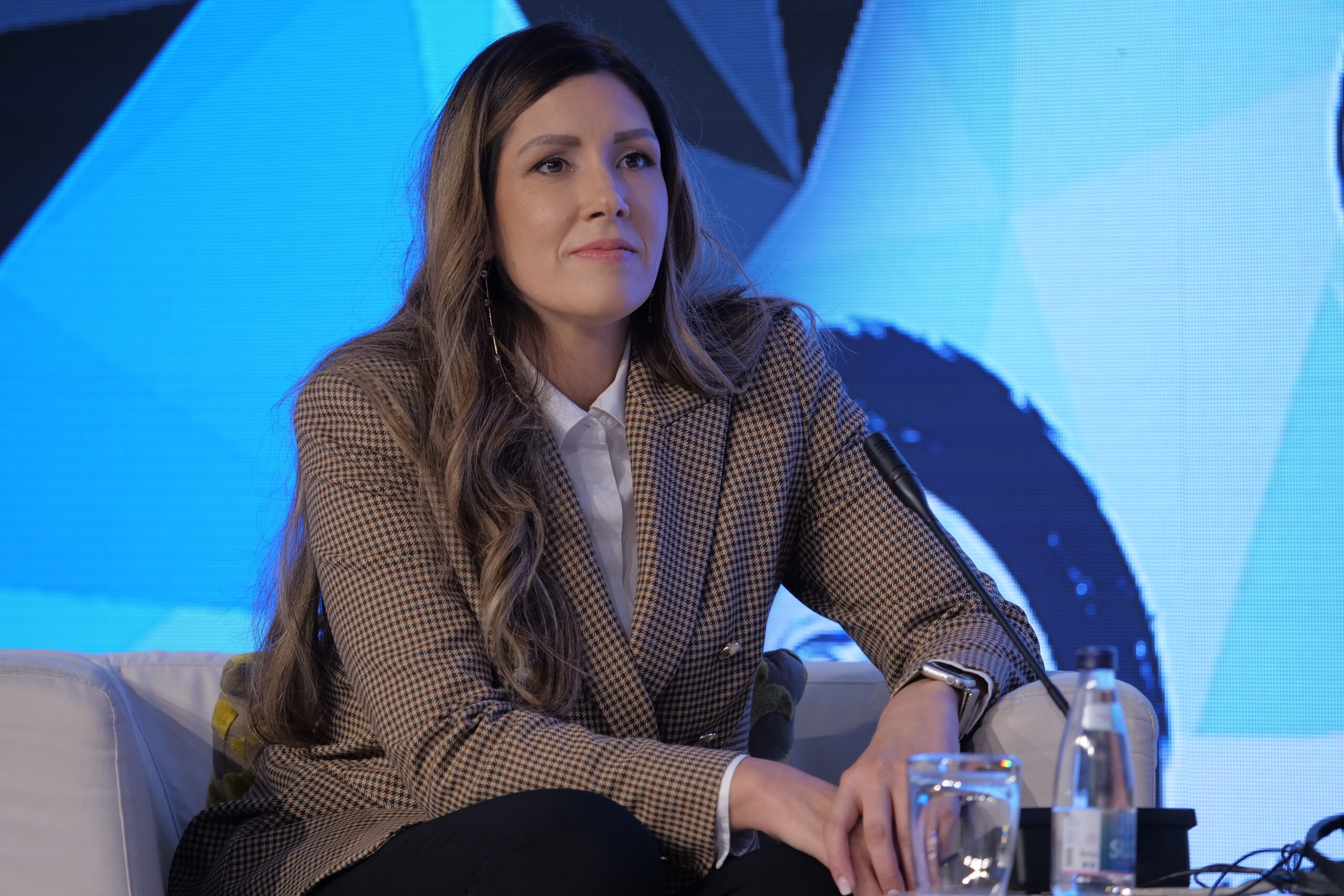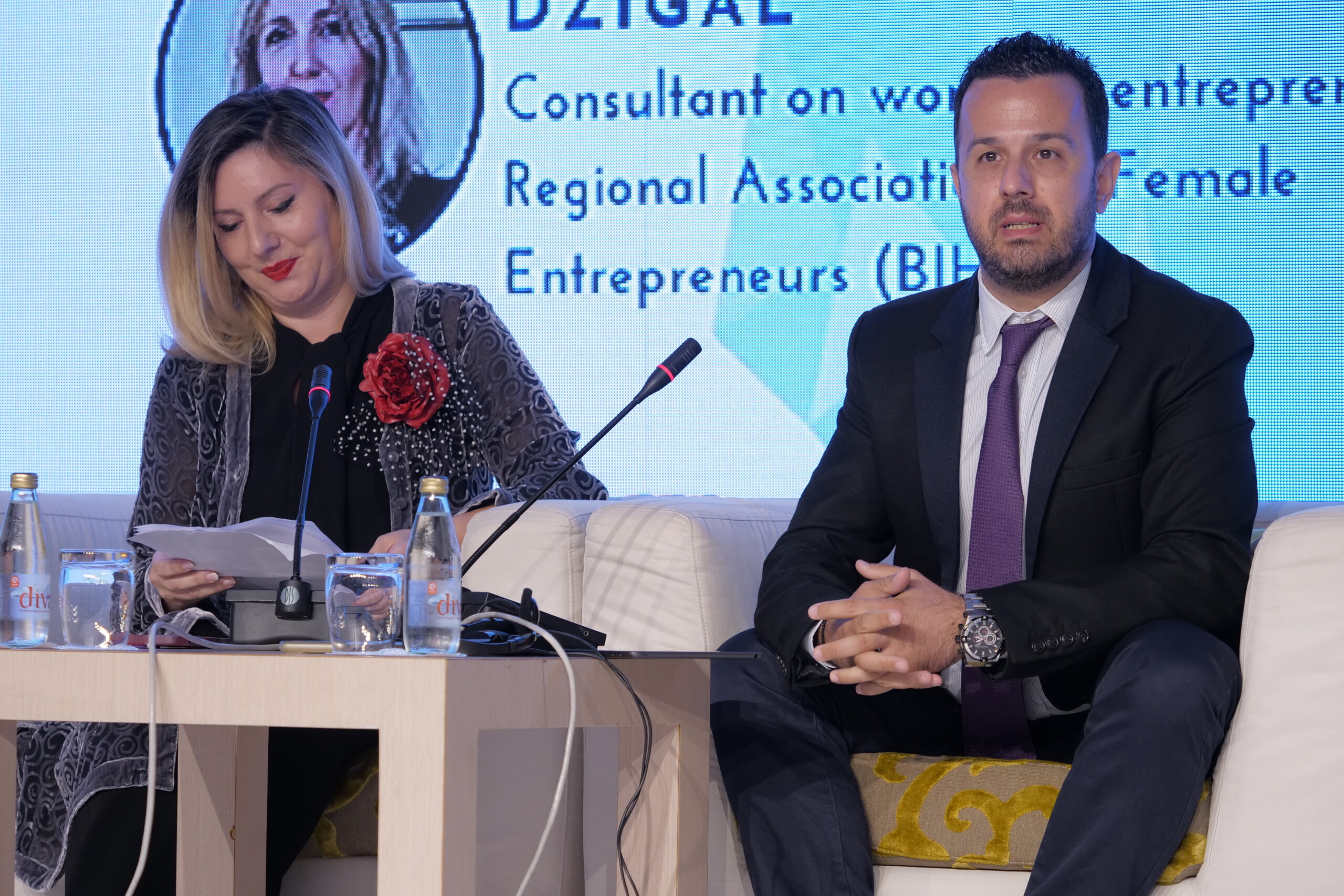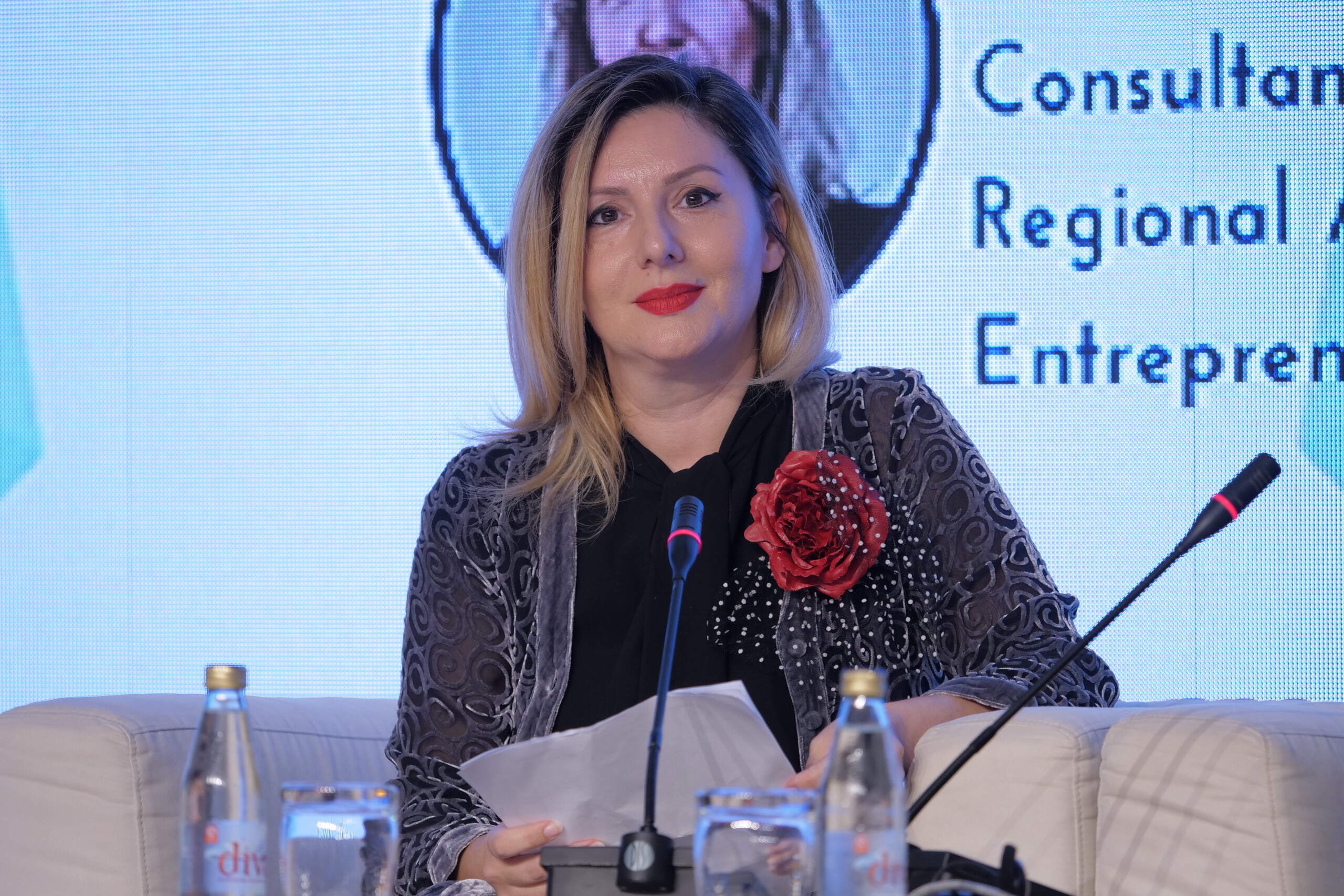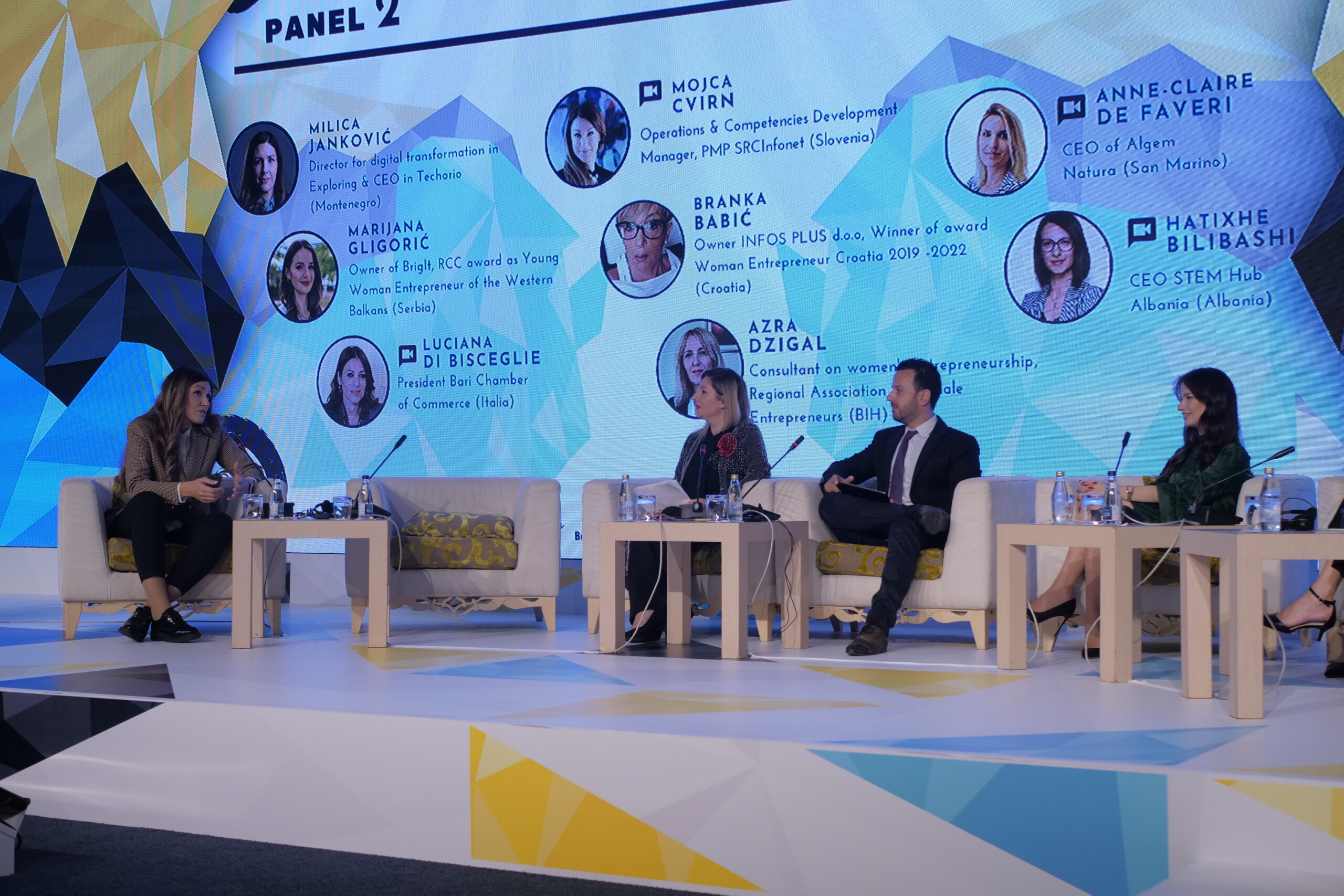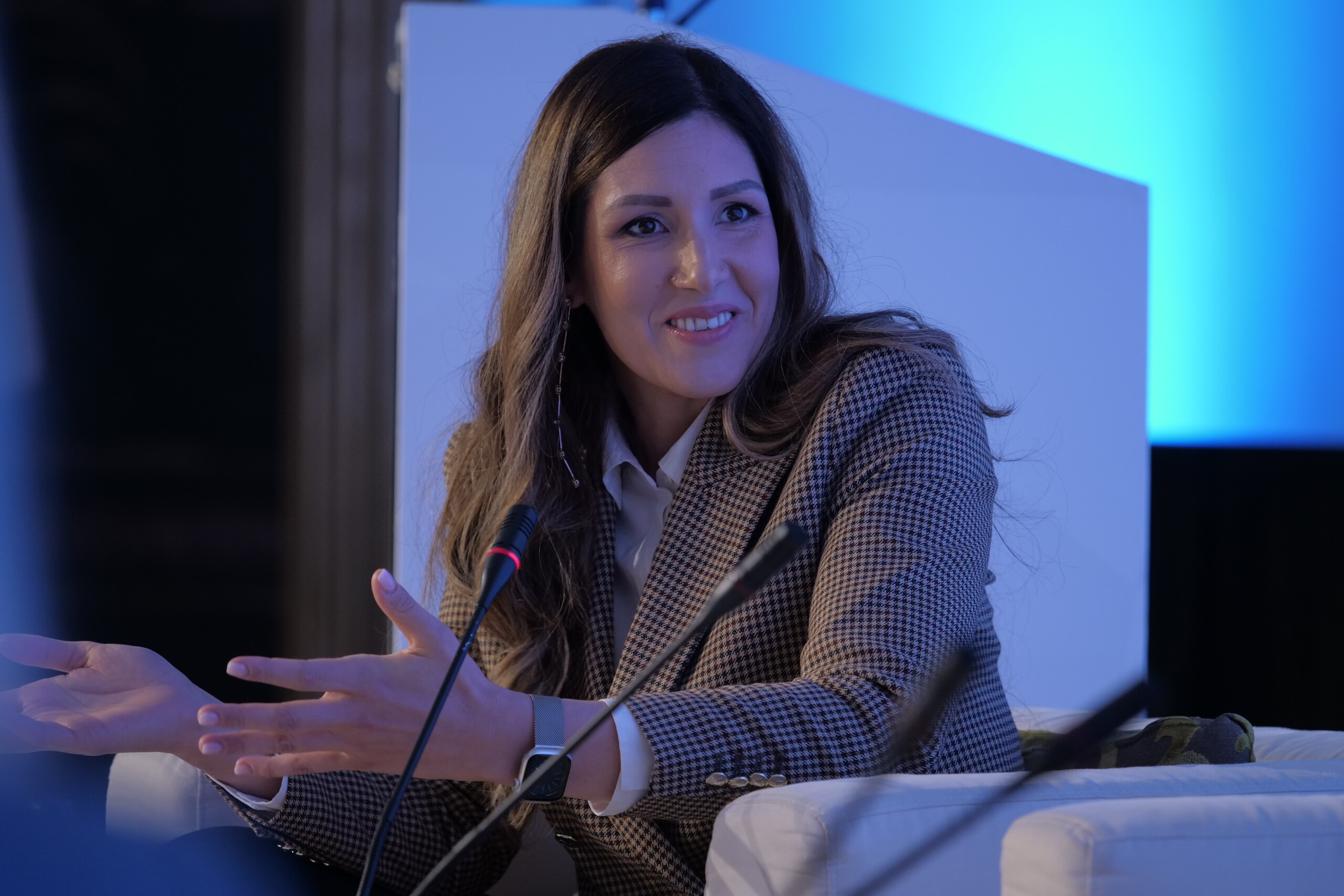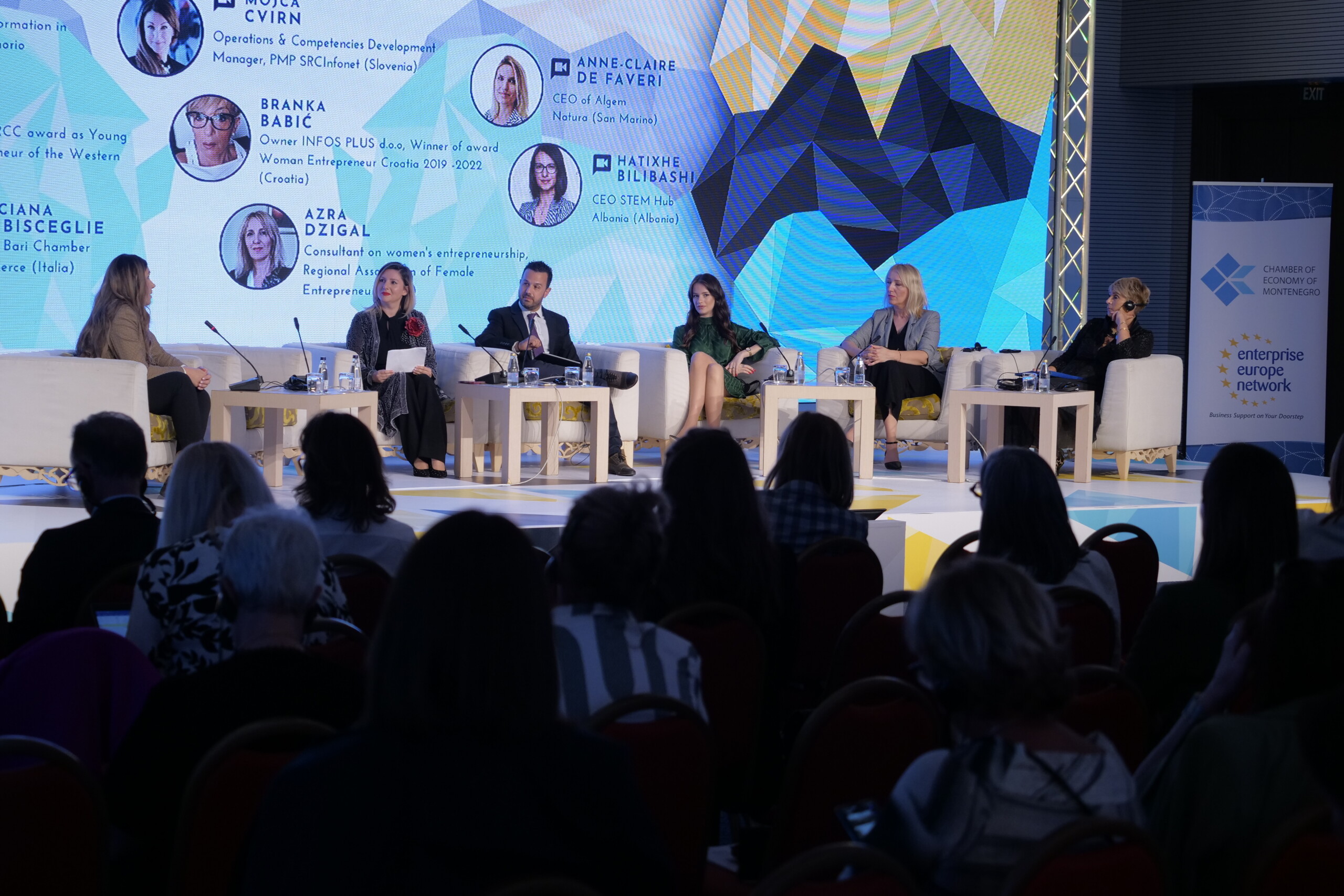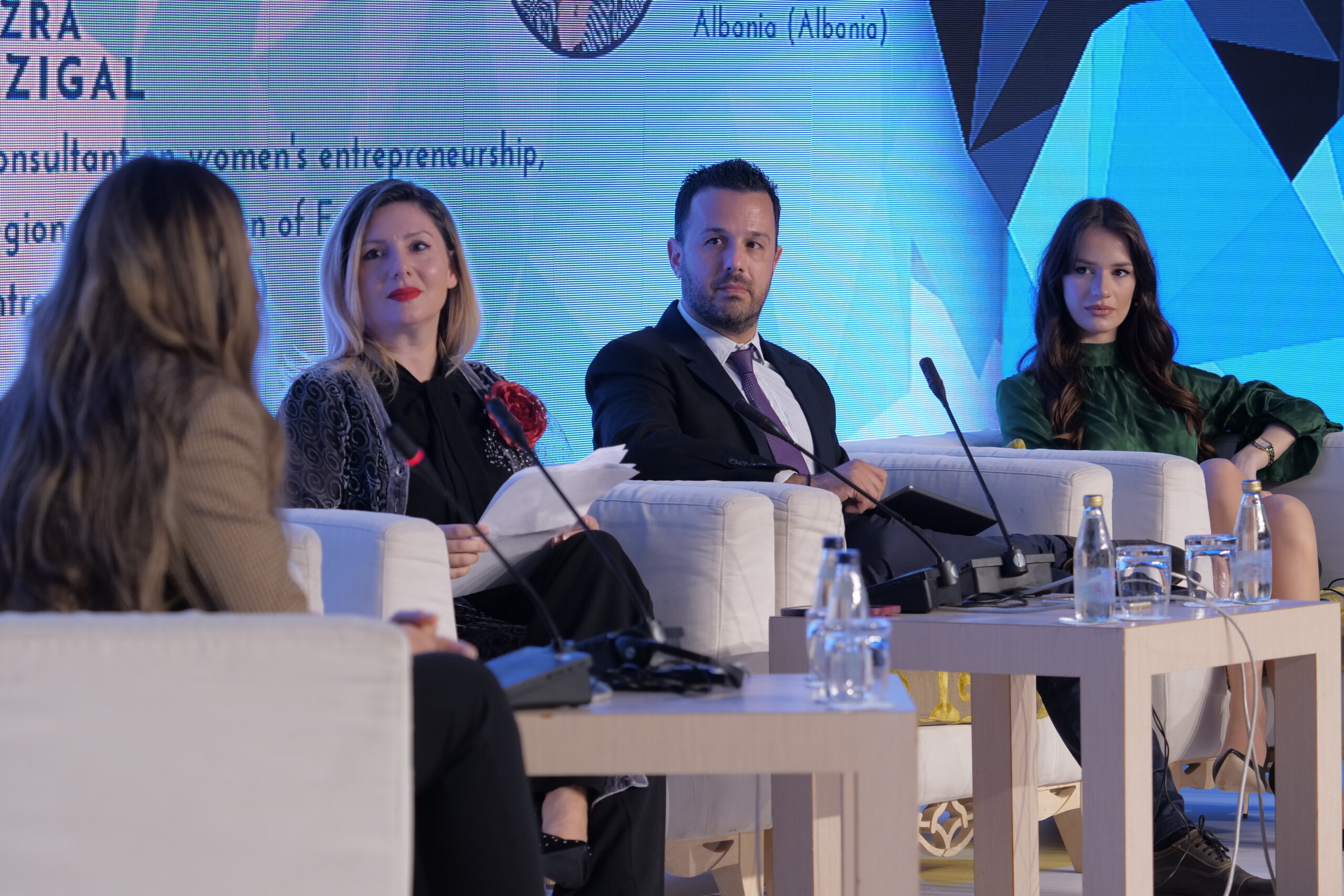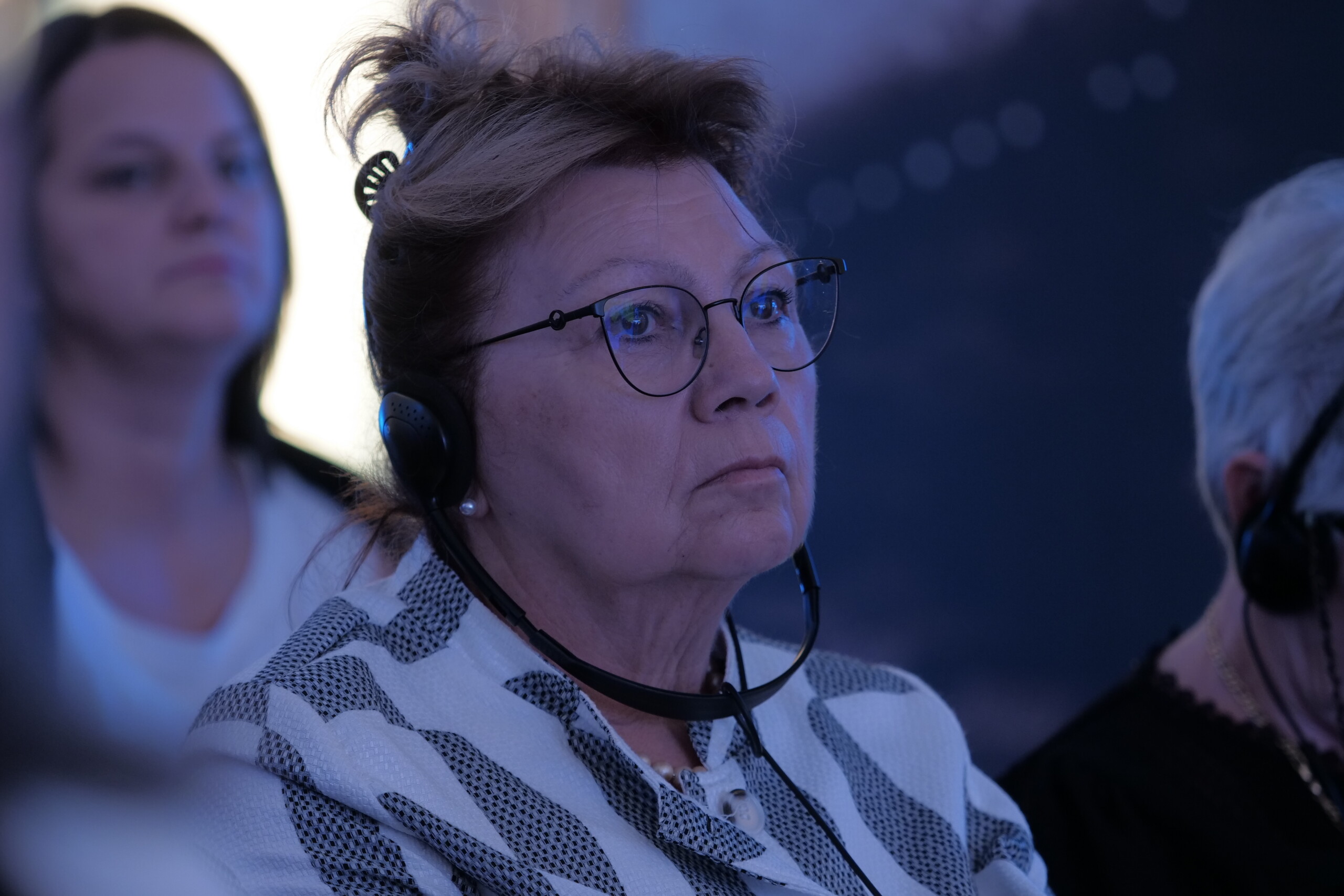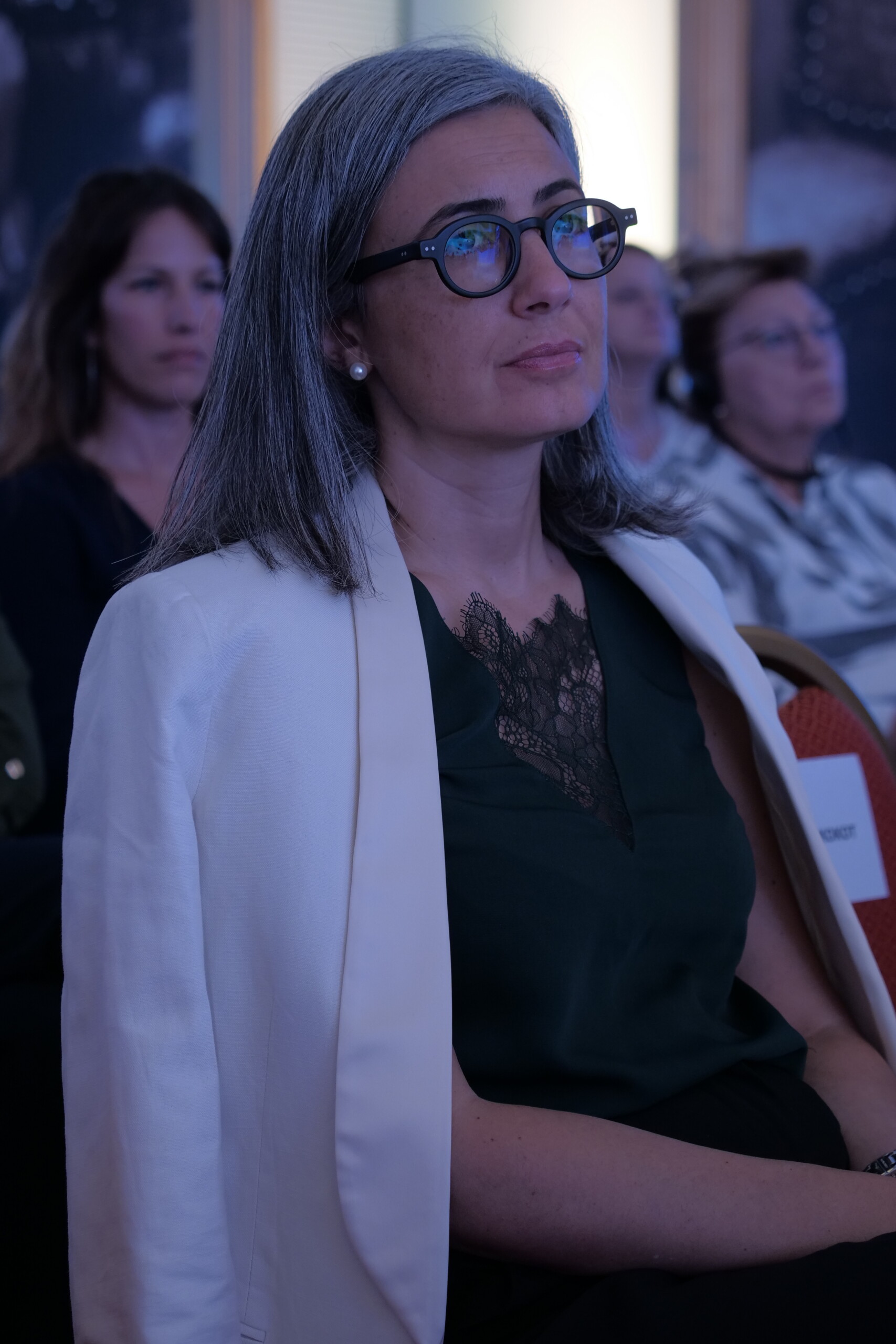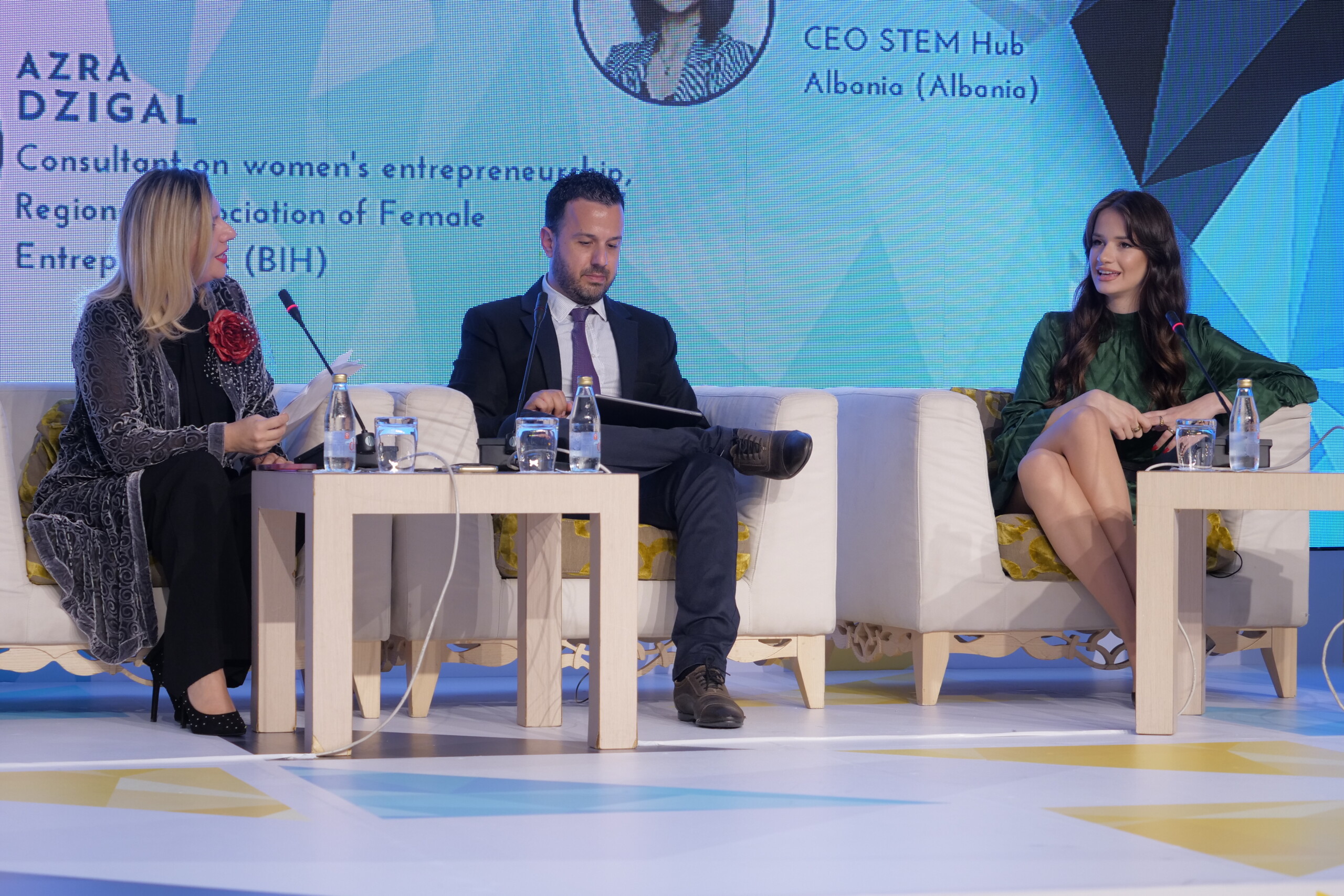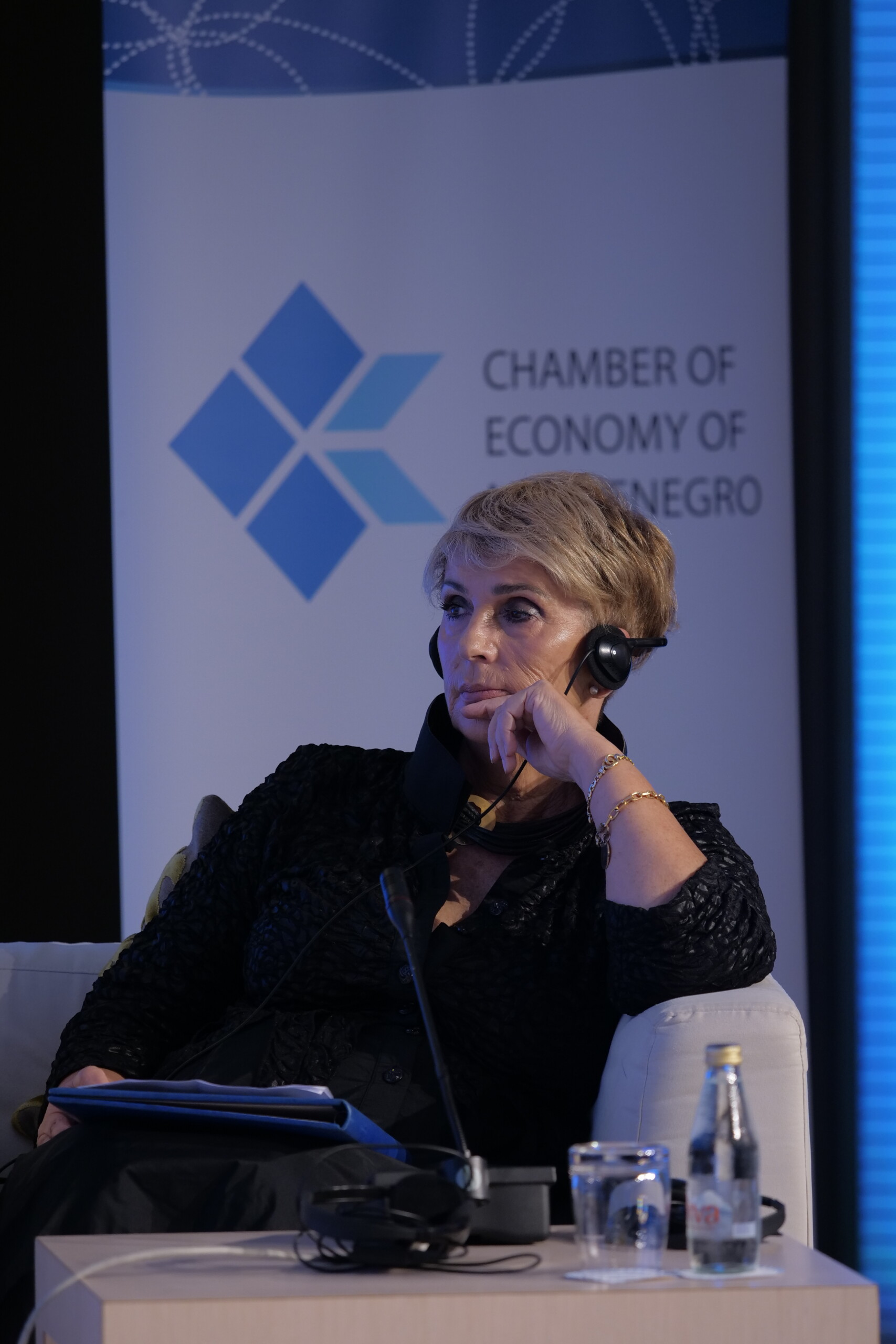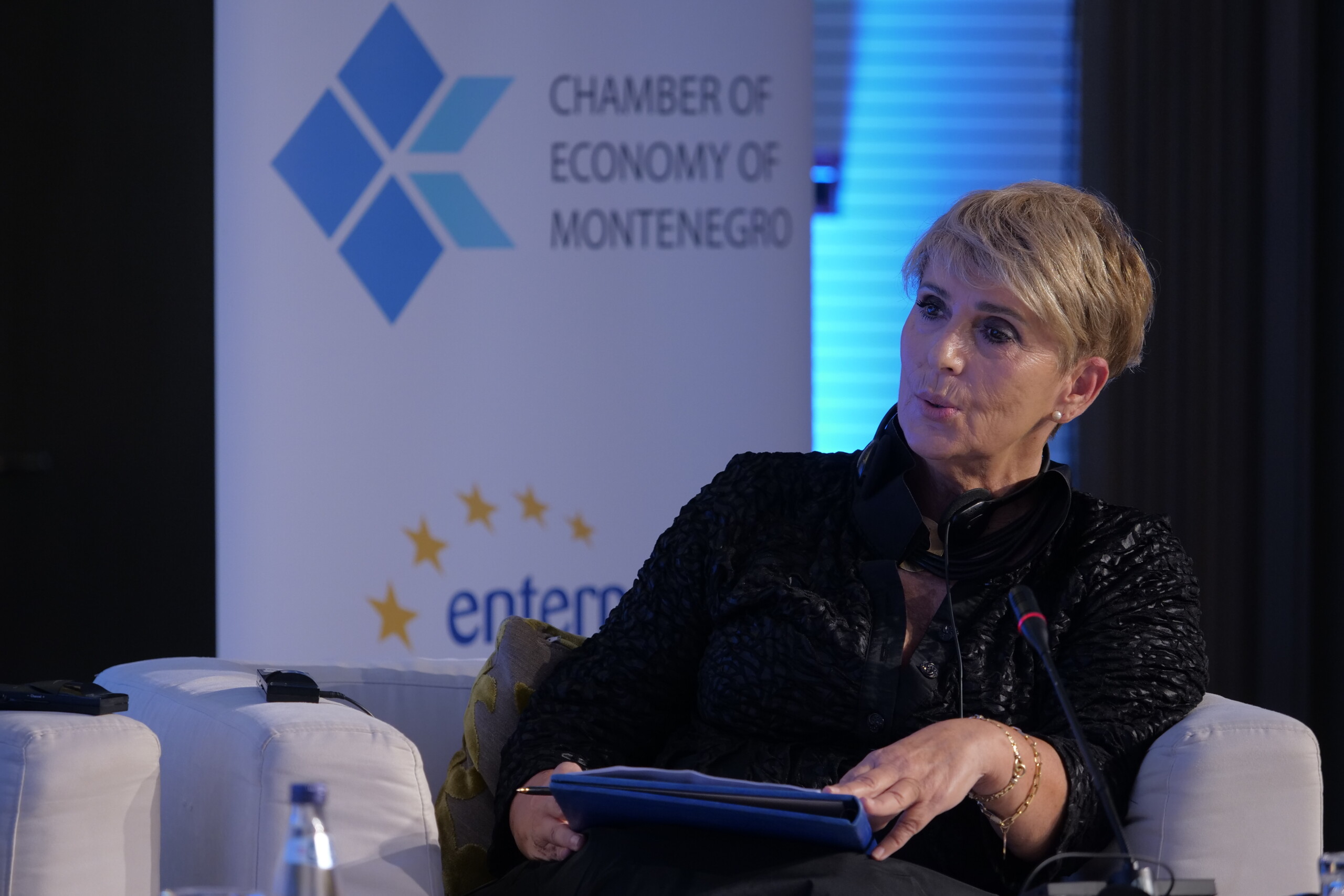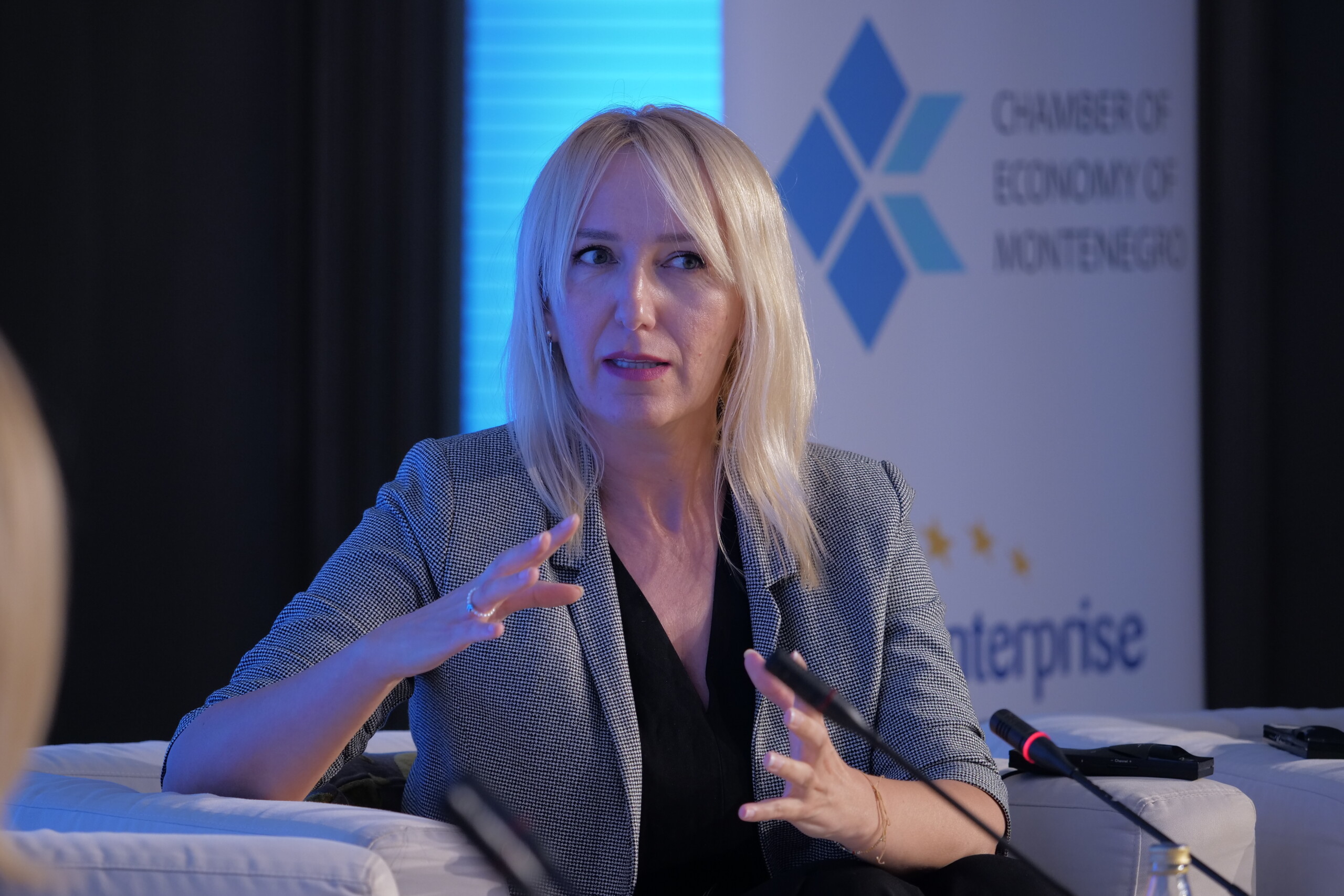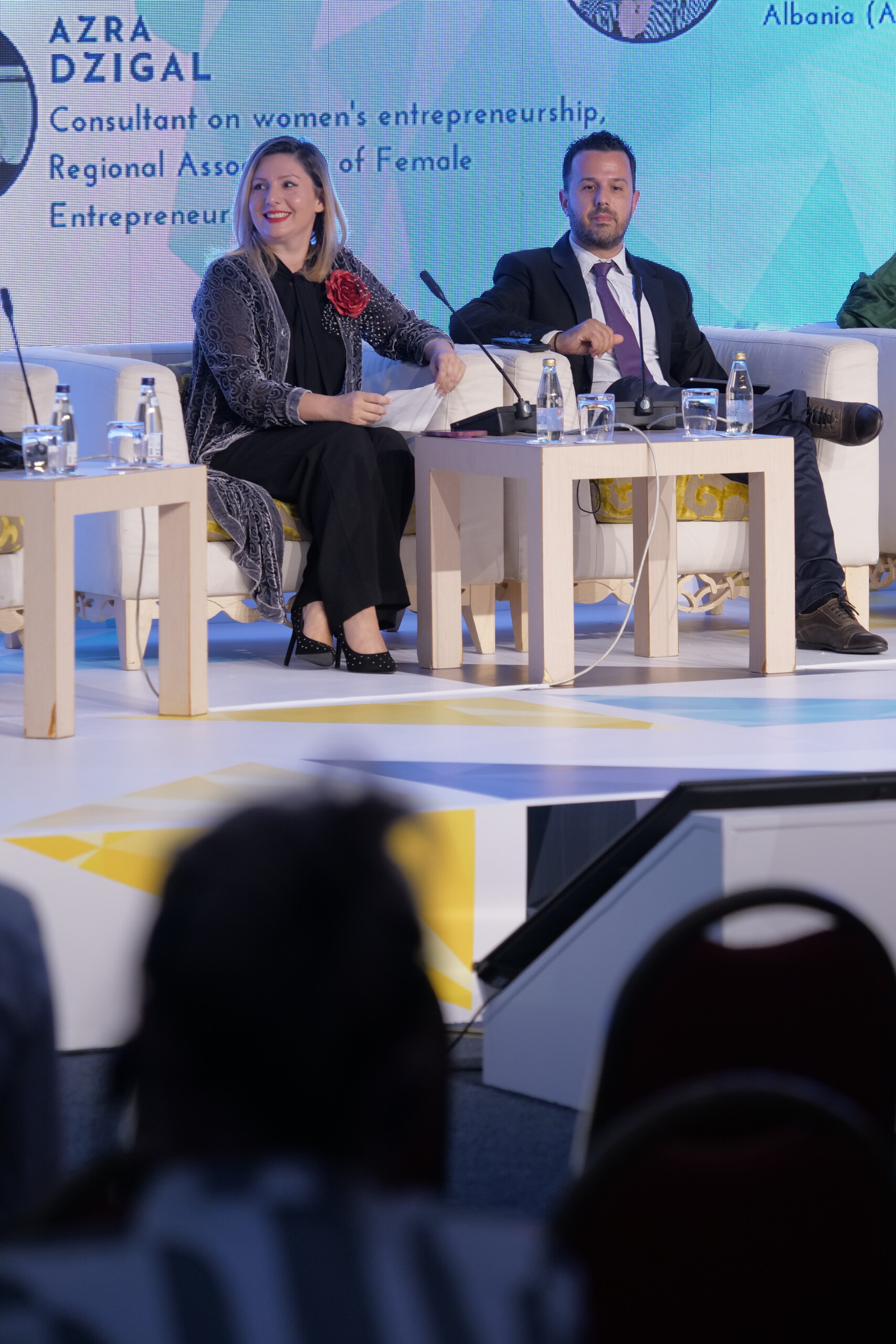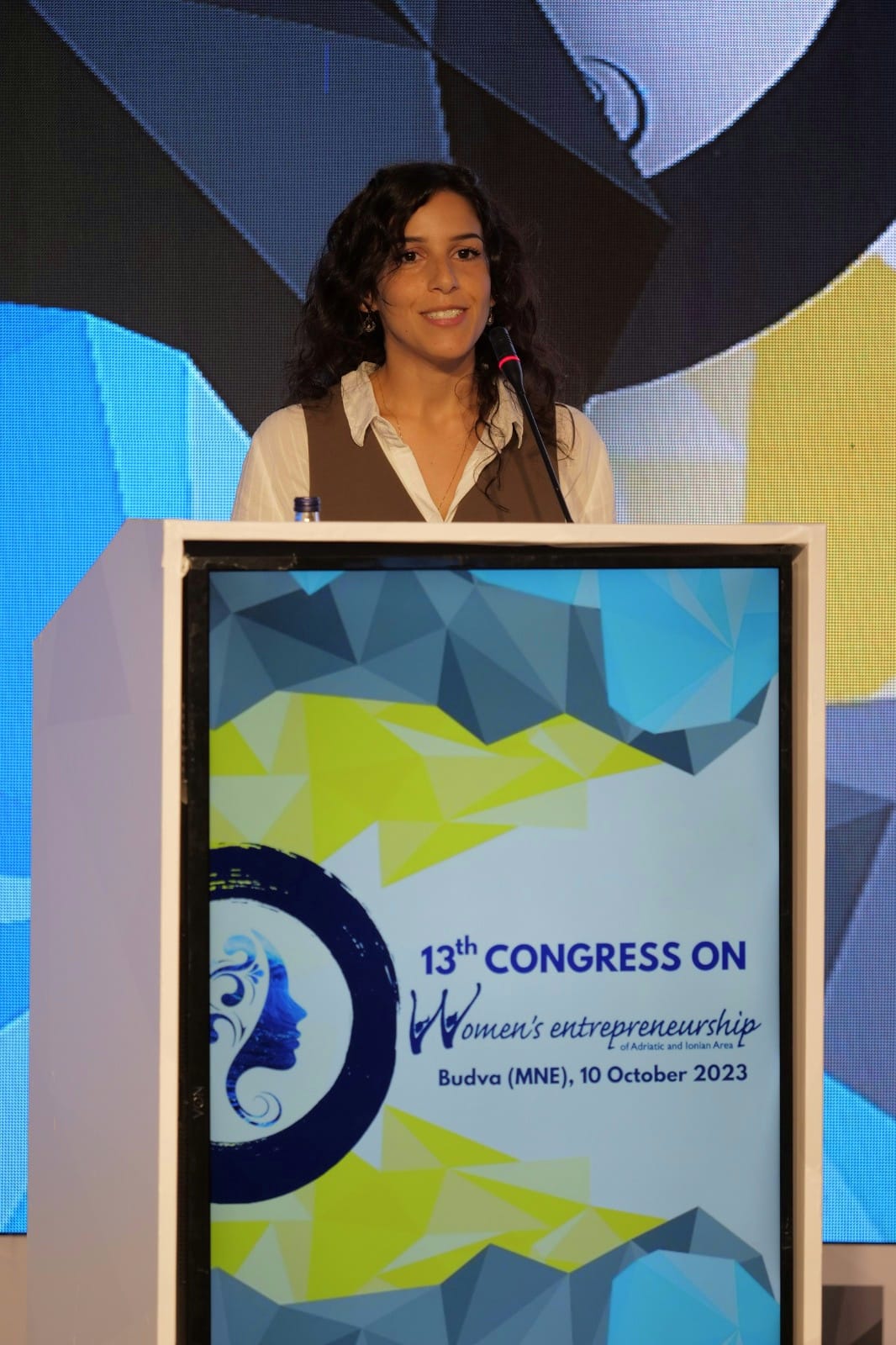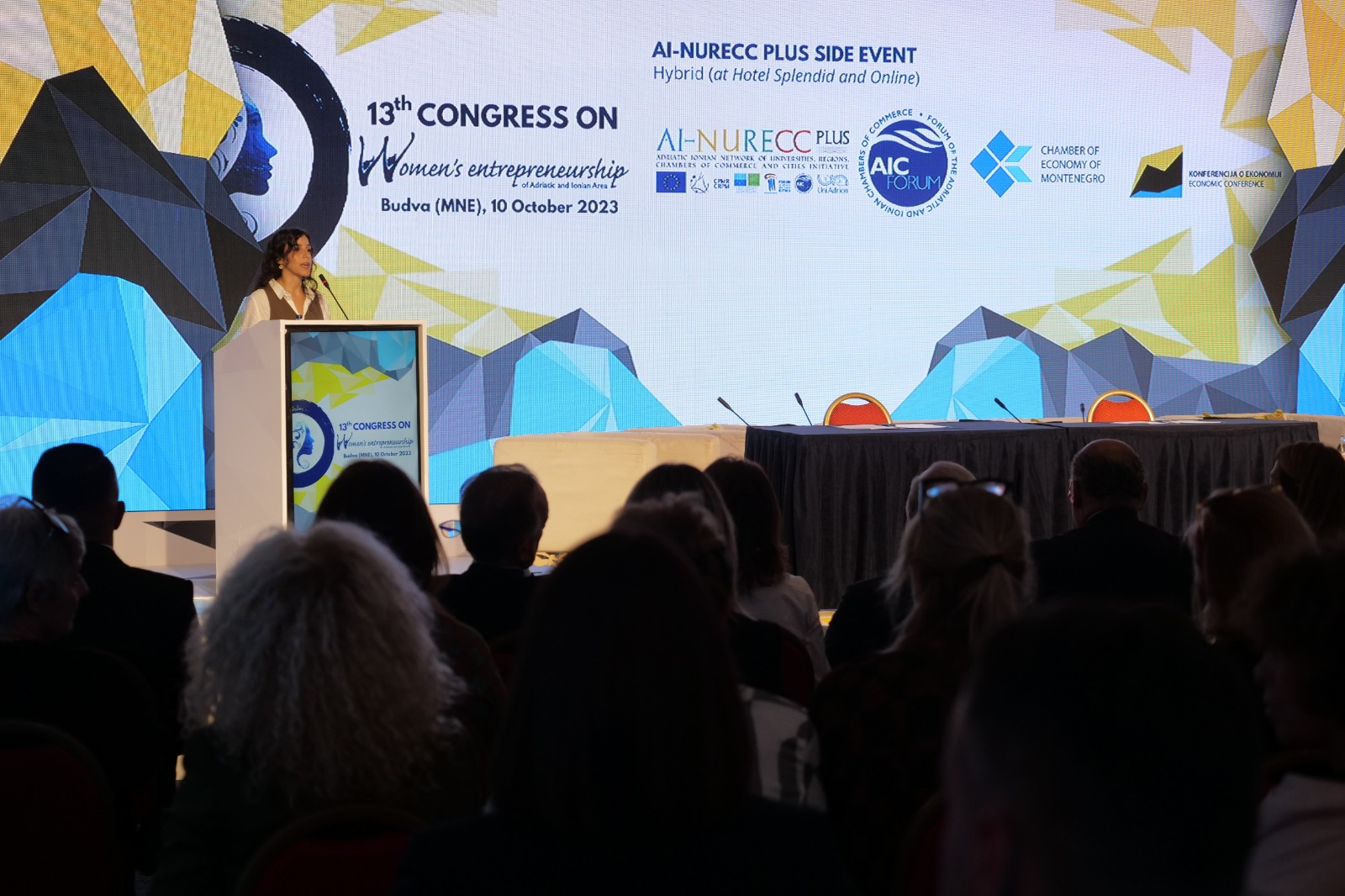In the framework of the AI-NURECC Plus Initiative, the Forum of the Adriatic and Ionian Chambers of Commerce, in collaboration with Chamber of Economy of Montenegro, organised the AI-NURECC Plus Side Event, on the theme of Women’s Entrepreneurship, that was held on the 10th of October 2023 in Budva (Montenegro) in hybrid modality, seeing the engagement of more than 180 participants. This year the congress was held within the framework of the Enterprise Europe Network EEN.
Since 2006, the Congress of Women Entrepreneurship has intended to present the state of art in the Macro region, and raise awareness on the important topic of Women Empowerment in the entrepreneurial sector, through the voices of the highest representatives of the sector. The Congress, focusing on the most eminent initiatives enhancing women’s entrepreneurship, aimed to provide an interregional perspective on the best practices and challenges prevailing in increasing the economic empowerment of women and entrepreneurial activities in the Adriatic and Ionian Region. The key topics of this Congress Edition have been women’s empowerment for business development with a focus on the role of women in STEM (Science, Technology, Engineering, Mathematics); breaking down the traditional gender working barriers.
Moderating the Institutional Greetings and Opening Session was Ms. Camilla Chiappini, Communication Officer of the Forum of Adriatic and Ionian Chambers of Commerce, who gave the participants a background for the event, organised under the umbrella of the AI-NURECC Plus Initiative, aiming at exploring the initiatives undertaken in order to empower women in business and entrepreneurial sector, analysing as well which are the gender working obstacles and how to overcome them, through direct female entrepreneurs’ testimonies and experiences.
The President of the Chamber of Economy of Montenegro, Nina Drakić, emphasised in the institutional greetings that a strategic policy and legislative framework has been established in Montenegro for the purpose of supporting women’s entrepreneurship. According to Drakic, in Montenegro it has been reestablished the strategic framework to support strategy for female entrepreneurship (2021-2024), affirming the dedication to provide support in strengthening services and activities and overcome key challenges for women entrepreneurs. “Data shows that more and more women in Montenegro are starting and running their own businesses, despite the many challenges. Today every four companies are owned by women or women are the majority owners” – Drakić said. The President emphasised the role of the Chamber of Economy of Montenegro in the development of women’s entrepreneurship, estimating that the business association will further dedicate itself to the empowerment of women in the entrepreneurial sector in the coming period. “It is necessary to strengthen the promotion of female entrepreneurship and the best women entrepreneurs, providing training on launching and improving businesses, organising the exchange of experiences, with constant work on creating a more favourable and stimulating business environment, and continuous financial support for women in business”, said President Drakić. She also recalled that last year the Chamber of Economy of Montenegro signed the awards for female companies that distinguished themselves for successful operations and presented excellent results in the entrepreneurial sector. “I believe it is time to better promote the contribution of women in research, innovation, and science in general. Women are important agents of change, and using the potential of women’s entrepreneurship will be crucial for the sustainable and inclusive recovery of our economies and societies from crises” Drakić concluded.
The Head of the Permanent Secretariat of the Adriatic-Ionian Initiative (AII), Ambassador Fabio Pigliapoco, positively welcomed the Congress, stressing the great importance of the macro regional strategy and the strong contribution of civil society institutions to its implementation. “This contribution is well recognised by governments and the European Commission in official documents, and I am convinced that it will be significant for the macro regional strategy during the Croatian presidency of the Adriatic-Ionian region”. Women’s entrepreneurship is set among high priorities of AII’s macroregion agenda and roundtables, and these issues are extremely important for the strategy. He encouraged women entrepreneurs to continue their activities and achieve their goals.
Gino Sabatini, President of the Marche Chamber of Commerce and new President of Forum AIC, expressed his particular pleasure in attending the 13th Women’s Entrepreneurship Congress, which deals with issues of great importance. “Since the very beginning, our association has stood at the frontline, to give voice and the right recognition to the many economic realities led by women, and has organised the Congresses of Women’s Entrepreneurship of the Adriatic and Ionian Area, now at its 13th edition” President Sabatini claimed. “The Congresses, as you will have the chance to see today, are organised to be moments of dialogue and discussion on many different urgent topics, such as women in STEM, digital innovation, tourism, sustainability and many others”, he emphasised. The President also stressed how “during these appointments, it has always been essential to us to make both entrepreneurs and public authorities learn about the services offered in our macro region. We know that activities in the field of women’s entrepreneurship have suffered greatly from the restrictions caused by the Covid pandemic, so I think we should all become aware of the importance of accurate data on women-led companies”.
MEMORANDUM OF UNDERSTANDING – STRENGTHENING ECONOMIC COOPERATION BETWEEN THE CHAMBER OF ECONOMY OF MONTENEGRO AND THE MARCHE CHAMBER OF COMMERCE
During the Congress, the President of the Chamber of Economy of Montenegro, Nina Drakić, and the President of the Chamber of Commerce of Marche, Gino Sabatini, signed a Memorandum of Understanding. The main objective of this agreement is to strengthen economic cooperation and business growth through the exchange of information and best practices, support of entrepreneurship through cross-border activities, and development of innovative projects in the areas of green and digital transition, with a focus on energy efficiency, renewable energy sources, and sustainable mobility. This cooperation opens the door to mutual benefits in the areas of economy, trade, knowledge and business and promises to create new opportunities for growth and development. The memorandum is a significant step forward in strengthening ties between Montenegrin and Italian companies, and will enable them to benefit from this strategic partnership.
OPENING SESSION: OVERVIEW OF WOMEN-LED ENTERPRISES IN THE ADRIATIC-IONIAN REGION: AVAILABLE DATA AND CONSIDERATIONS
Before the first discussion panel of the 13th Congress on Women’s Entrepreneurship organised by Chamber of Economy of Montenegro and Forum AIC, the opening session included speeches from Nikolina Trojić, President of the Dubrovnik Chamber of Commerce, and Ljiljana Burzan Nikolić, Top Women Business Montenegro.
Nikolina Trojić presented the results of the survey conducted by Forum AIC regarding the state of the art of services and support available to women-led enterprises by macro-regional public bodies. She highlighted several key points related to women’s entrepreneurship and gender equality, as well as demographic data on the female workforce. Trojić also recalled the historical engagement of the Forum within the Female Entrepreneurship’s framework and stressed its importance in the form of efforts to support and empower women entrepreneurs in the region. “The survey, structured by another report compiled by Eurochambres, with the addition of the priorities found in the Agenda 2030, the directions of the European Union and the UN, aimed to investigate the state of the art of services and support available to women-led businesses from macro-regional public bodies”, she stressed out. “Obstacles in female entrepreneurship are still evident. The main obstacle for women entrepreneurs still remains the family/work combination, an aspect that needs attention and improvement”. According to the survey, in order to overcome obstacles for women who are already engaged in business or intend to be involved in the sector, institutions proposed several solutions such as promotion of role models, ensuring support to re-enter the job market after creating a family, as well as grants access to direct/indirect funds, support in drafting a business plan and a company price policy and psychological help-desk.
(The Survey is still open and reachable at this link: https://docs.google.com/forms/d/e/1FAIpQLSfmsl2SqRcc8NBywCTwgzMYQZ89Rod4ImZis7tetCK3ToDvRg/viewform?pli=1 )
Ljiljana Burzan Nikolić introduced to the audience Top Women Business Montenegro, a platform that analyses the entrepreneurial activities of women in Montenegro, representing companies, organisations, institutions, and personalities that have contributed to the development of the women’s business community in previous years. The specificity of the initiative is the analytical approach to the topic, which consists of monitoring the number of participation and business outcomes of female entrepreneurship over the past five years, as well as monitoring changes in their structure. “This year’s TWBM analysis, by the way, also shows that the participation of “women-led enterprises” (as defined by IWA MEST 34) continues its downward trend, and by 2022 it amounts to 20.33 percent, with a significant decline recognized in women-led enterprises. This result leads us to question whether existing support models stimulate greater participation of women in businesses, even if formal, and not sufficiently their essential involvement in management”.
PANEL 1: IMPORTANT INITIATIVES FOR WOMEN’S ENTREPRENEURSHIP DEVELOPMENT
The first discussion panel “Important Initiatives for Women’s Entrepreneurship Development,” was moderated by Marija Risteska, Secretariat of Competitiveness Council, and Alessandro Cinti, Marche Polytechnic University. Moderator Risteska said that developed countries achieve growth by unlocking the untapped potential of women in the labour market. We need active policies in this direction and measures to encourage women’s entrepreneurship.
Kaća Đuričković, head of the Gender Equality Team at the United Nations Development Program (UNDP) office in Montenegro, believes that there is a lot of room for improving the environment for women’s entrepreneurship development, which requires the continuous engagement of stakeholders and decision-makers. She stressed the need to provide favourable financial resources for women-led enterprises, so their main focus is on grant support. “We cannot deal with the development of women’s entrepreneurship without dealing with the improvement of the entire system, starting from education to the labour market”. Only 14% of women are represented in the STEM sector, and these are the professions of the future. It is an area that requires answers and improvements.
Sanja Popović Pantić, President of the women’s entrepreneurship thematic group within the EU project ‘European Entrepreneurs Network’ (EEN) and also representative of the Association Business Women in Serbia, spoke about the support the EEN provides to women-led enterprises. EEN supports female entrepreneurship and assists over 500 women who own and run their own businesses. According to Sanja, the main goal is to recognize and support all women entrepreneurs in various fields, such as STEM, Digitalization, Green technology, and so on, in preference to highlighting a single top female entrepreneur. “Economies with more gender equality perform better”, she stated.
Tiziana Pompei, Deputy Secretary General of Unioncamere Italy, spoke about the role of women entrepreneurs in traditionally male-dominated sectors, the expansion of innovative start-ups in Italy, and the importance of statistical data in the field of female entrepreneurship. “Unfortunately, Women’s Entrepreneurship in Italy is mainly focused on the services’ sector. However, innovative start-ups are growing, especially during the Covid pandemic there has been a growth in women’s involvement in businesses that require a higher degree of competence and digital skills” affirmed Pompei. It is necessary to work towards digital transformation, which will result in a radical change in management, in new ways of thinking, in new business models. It is also important to put at the centre of discussion the development of skills in the STEM sector, encouraging more women to focus on some traditionally male entrepreneurial activities and to constantly emphasise the importance of the STEM industry when choosing specialisations in studies.
Evisi Kopliku, expert on Competitiveness at Regional Cooperation Council (RCC) for South East Europe, in the working group for Women Entrepreneurship, expressed her gratitude to economist Claudia Goldin who has been awarded the nobel prize for having studied and advanced the understanding of gender gap pay. According to her, the Regional Cooperation Council takes into account the women’s challenges in business and contributes to female empowerment through developing the awareness of women’s emancipation in the Western Balkans, encouraging regional and EU cooperation, as well as implementing monitoring policy for women’s entrepreneurship. Among other things, RCC has developed mentorship programmes regarding gender equality for business women associations, as well as capacity building seminars for policy makers who are involved in the sector and need upgrades, and the ‘Choose STEM’ campaign, which contributes to the empowerment of women in the STEM sector.
Alma Harašić Bremec, President of KRUG – Croatian Business Women, says that all initiatives and activities that encourage female entrepreneurship are worthy of praise, and we should certainly continue to work on them, finding different ways to reach future entrepreneurs who come from different backgrounds, have different skills, lifestyles, interests and often use different communication channels through which information reaches them. “Women need to receive legislation and institutional support, in order to find their career directions and start their own businesses. Our members dedicate part of their time, knowledge, experience and proven skills to mentoring young female entrepreneurs. Mentoring is optimal for a period of two years, after which Kružica mentors remain available to mentor entrepreneurs. We have the best results in mentoring with young female entrepreneurs who have started their new businesses as part of the business incubator for which the Croatian Chamber of Commerce in Split has secured an entire floor. In this way, young entrepreneurs receive both professional and institutional support and help at all stages of starting a new business”.
Marina Duhani, the president of the Shkodra Regional Council presented the role of the local community in supporting female entrepreneurship and informed about projects, initiatives and strategies that improve this area in Albania. “In the general overview of the female entrepreneurship in Albania, it is clear that the women’s participation in the Albanian economy is strengthening more and more, however there is a financial gap in supporting women who start a new business. 70% of women entrepreneurs relied on familiar and personal savings as main financial sources to start a business, while 30% asked banks for money loans that were accepted” affirmed Duhani. The majority of women believe that they managed to successfully enter the entrepreneurial sector, however others claimed that there are still obstacles for women entrepreneurs, such as lack of purchasing power, information and promotion, as well as high competition and decrease in purchase requests. Duhani also said that it is necessary to involve women more in European projects, to advise them and to enable them to better position themselves on the market. She particularly emphasised the importance of the project on the formation of an international network through which women from the Adriatic-Ionian region will have the opportunity to establish numerous contacts and find an online market to promote their products.
Idaira Robayna Alfonso, EISMEA Project Advisor, European Commission, emphasised that women play an important role in economic recovery because they are more proactive, innovative in business. “When we achieve product equality, this will contribute to the creation of millions of new jobs in the EU”. The key to EISMEA is to improve the visibility and promote successful women entrepreneurs. She presented their support projects, mentoring work with women entrepreneurs, and efforts to ensure that the largest percentage of women-run businesses receive financial support from the EU. “It took 10 years of negotiations to adopt the directive on gender balance in boards of directors. We are moving towards this goal step by step”.
Anela Lemeš, Women’s Economic Empowerment Programme Coordinator – UN Women Generation equality, emphasised during her presentation the importance of capacity building and economic empowerment of women. “70% of global employment is based on micro and SMEs development, which represents a huge opportunity for women’s entrepreneurship. We need to explore and jump into this area and provide support to women as much as possible” she said. The biggest goals are improving knowledge and skills, and access to finance provided by governmental institutions, which are very limited especially as regards women’s entrepeneurship. It has been highlighted the lack of networks where women can confront each other and speak directly with investors. Lemeš highlighted the EXPO project as a positive example, which brought excellent results and helped women to connect and learn from each other. Some of them increased sales and revenues as well as the number of employees. What is not so positive, according to her, is the decision of investors to invest much more in male-owned companies. She says that we all still have a lot of work to do to address all the obstacles and be aware of the problems in our countries.
PANEL 2: WOMEN IN STEM: BREAKING DOWN THE TRADITIONAL GENDER WORKING BARRIERS
Jasna Pejović, CEO Flourish & CEO DigitalBee (MNE) and Dimitrios F. Bakalis, Project Manager of EU-funded projects, Ilia Chamber of Commerce, moderated the panel “Women in STEM, breaking down the traditional gender working barriers”. The moderators pointed out that there is currently a shortage of more than one million STEM experts in the EU and statistical data show that only 25% of the total number of people involved in STEM disciplines are women. That is why the question of how to encourage women to start a career in this field and how to promote it is the topic of this panel.
Milica Janković, Director for digital transformation in Exploring & CEO in Techorio in Montenegro, highlighted the importance of creating relationships and understanding people to create a successful business. In the biggest technical companies like Meta, Apple, Microsoft and Google job opportunities are not only related to technical jobs, however the 65% of open positions are targeted to project managers, designers, lawyers, as well as HR, sellers and buyers. “What is necessary in the future is diversity. Diversity in skills, in knowledge, sectors, subjects. We need multidisciplinary programmes, including art and literature, and different types of communication. Companies need both extroverts and introverts, leaders and people who follow the leader. University of Donja Gorica insists on diversity in every study program.
Marijana Gligorić, Director of ‘BrigIT’ in Serbia, presented her entrepreneurial and development path that led her through the Faculty of Electrical Engineering in Belgrade and into work in the IT sector. She had the main idea of developing a system to transfer money between mobile phones, with her colleagues she created an application that received top ratings and such talent was recognised in the IT community, so they were hired for additional work. She believes that women in business need role models and support, which is why she formed the Girl Power movement, which spreads business knowledge and networks women entrepreneurs. “My advice to women entrepreneurs is to find mentors as soon as possible, preferably different ones for different business areas, and follow their path and advice. Try to learn as much as possible in the shortest possible time”.
Mojca Cvirn, Operations & Competencies Development Manager, PMP SRCInfonet in Slovenia, spoke about the empowerment and motivation of start-up teams and the role of women in this field. She also referred to women entrepreneurs in Slovenia, emphasising that their position at first glance is much better than in other countries in the region. “In our country there are many women in important positions and we also learn from examples of good practice”, Cvirn said. She emphasises in particular the importance of the business incubators in Ljubljana and the Technology Park, where small communities for networking and knowledge exchange have been successfully established. However, she emphasised as well the need of investing in women’s entrepreneurship, because even though the women’s conditions in the entrepreneurial sector in Slovenia are well developed, there are still more men-led companies. It is also necessary to introduce further programs for supporting women’s entrepreneurship in order to include more and more female leaders and managers. There are numerous opportunities to create communities that could receive more support from investors, as well as small local ventures, business incubators and more, but that more emphasis should be placed on examples of success stories in the field of female entrepreneurship.
Branka Babić, owner of INFOS PLUS d.o.o in Croatia and winner of the Woman Entrepreneur Croatia Award 2019 -2022, has been involved in the IT sector for 30 years. “When you feel you have the talent to engage in private business, then go for it. Although it was hard during the 1990s due to the war and its economic transition towards the private sector, I felt I had an entrepreneurial soul and I managed to start my private business anyway. In 1996, I already had 28 employees” explained Babić. She explained how the global financial crisis and the EU accession for Croatia had an impact on her company as well, on the one hand leading to a digital transition and on the other to a higher competition in the sector and brain drain. In order to involve younger IT’s, she decided to include them in the management of her business, giving them part of shares of the company. Since they need guidance in the process, she serves as a mentor for them. “My advice for women who aim to launch their own business is to speak with women who have experience in entrepreneurship and business”.
Azra Džigal, independent consultant on women’s entrepreneurship, member of the Regional Association of Female Entrepreneurs in Bosnia-Herzegovina, reflected on the challenges faced by women entrepreneurs and shared her experience on the key skills needed to succeed in this field. “It is important to understand the environment when we talk about Bosnia and Herzegovina, characterised by obstacles in education, mindset and tradition” affirmed Džigal. She explained how younger people in her country are not interested in launching a business as in European countries and US, but they look for stability and they mostly base their future career on public sectors, with long and stable jobs. Džigal mentioned the importance of introducing financial subjects and training courses at the tender age, in order to make people understand already as children how to invest and deal with finance. The main obstacles for female entrepreneurs are the lack of financial support and networking. It can be hard to get a loan or find financial support, even though there are some programs for one year dedicated to women entrepreneurs. It is interesting to notice that microcredit organisations are more in favour of providing loans to women because the return rate is for sure, since they immediately look for a way of returning money. As regards networking, it is necessary for both finding mentors and also to join forces and launch a business together, she highlighted. The focus should be on both the public and private sectors to support people with good ideas, cultivate the entrepreneurial spirit and create a favourable environment for business growth and development.
Anne-Claire De Faveri, CEO of Algem Natura from San Marino, said that during her career she had to work twice as hard as men to prove herself in business and overcome numerous obstacles on the road to success. Now, her home country has nominated her for an annual award for excellence in the profession. “The path to a leadership position is based on self-awareness and knowledge of one’s work. I support other women on their path to success because they have added value through their knowledge, empathy and sensitivity” said De Feveri. She added that flexible working conditions are very important in her company. “My team is 90% women, among whom there are many young mothers. Flexibility is crucial to support working mothers. They can take a break, go home and the like without any special procedure, so they do not feel the pressure of work”.
Luciana Di Bisceglie, President of Bari Chamber of Commerce and President of Terziario Donna of Confcommercio Bari/Bat, spoke about institutional capacities and the importance of legislative and strategic change in order to close the gender gap, and the measures that need to be taken along the way. She said that closing the gender gap in the business sector, and particularly in the STEM sector, is essential for society and the economy. “As president of the Bari Chamber of Commerce, I am aware that decisive steps must be taken to ensure equal opportunities for all, regardless of gender. It is not only a question of fairness, but also a question of economic sustainability and the competitiveness of our region” she said. It is important to take strategic measures to promote education and mentoring for women in STEM fields. This includes supporting programmes that inspire and educate girls and women to consider a career in these fields. In addition, she emphasised how it is necessary to create an inclusive climate in the workplace, where diversity is valued and women are provided with support and opportunities for professional development. “In our region, we have always worked to ensure gender equality and equal opportunities irrespective of gender” she said, hoping that younger generations in the future will have no problems deciding whether a company is run by a man or a woman.
Hatixhe Bilibashi, CEO STEM Hub in Albania, believes that it is very important to start entrepreneurship at a young age. “Many parents encourage their children to attend additional education, enrol them in sports or languages, but rarely steer their children towards new technologies. Guiding young people in that direction is very helpful. Young people today do not sufficiently exploit the advantages of technology, but use it mainly for fun. On the other hand, we have the development of artificial intelligence and understand that digital skills are necessary for everyone. It is also necessary to develop critical thinking and soft skills” Bilibashi said.
Stavros Kalognomos, Executive Secretary of the BBSC and CPRM and Coordinator of AI Nurecc Plus, summarised the debates heard during the Congress. “Female entrepreneurship is an indicator of the advanced economy of any country, and companies owned by women are more likely to initiate green and innovative topics” Kalognomos said.
